Feed aggregator
7 Author Shoutouts | Authors We Love To Recommend
Here are 7 Author Shoutouts for this week. Find your favorite author or discover an…
The post 7 Author Shoutouts | Authors We Love To Recommend appeared first on LitStack.
Party Planning Can Be Murder - Early Book Review
 Party Planning Can Be Murder: A Party Planner Mysteryby Kerry Schafer/Kerry Anne King
Party Planning Can Be Murder: A Party Planner Mysteryby Kerry Schafer/Kerry Anne KingWhat is it about:Wish List: pick up my pills from the pharmacy, plan my party, be there when I die…
Despite a few harrowing incidents with nervy Bridezillas, Addy Winters’ small town party planning business has been murder free – until now. But then, she’s never before been hired to throw a star-studded after-death party for a client who has their death scheduled on their calendar.
When Leno Masterson—former classmate, now legendary rocker with a flair for drama—turns up dead four days earlier than he’d planned, Addy suspects that someone helped him along. Sure, he left a melodramatic goodbye letter and his right-to-die paperwork is all in order, but even when the coroner rules natural causes, Addy isn’t buying it.
Addy’s family and friends – and Leno’s smolderingly hot brother Owen – warn her that she’s diving in over her head, and they’re right. She’s woefully unprepared for either the media onslaught or the secrets the people she thought she knew are hiding. But nothing is going to stop her from getting justice for Leno – and throwing a killer party while she’s at it.
If you love your mysteries with humor, heart, and a side of romance, this is your next must-read. Perfect for fans of Finlay Donovan and The Thursday Murder Club!
What did I think of it:There are some authors you follow to whatever genre they decide to write next. Kerry Schafer is one of those authors. When she switched from Urban Fantasy & Paranormal Thrillers to Women's Fiction as Kerry Anne King, I followed and loved those books as well. Her next release will be by both pen names and is a Murder Mystery!
You bet I jumped on the chance to be an early/ARC reader and let me tell you I devoured this book!
I was drawn in and emotionally invested from the first chapter. I fell in love with Addy and wanted her to succeed in everything she does. (I also thought some very not nice things about her family, apart from her brother and grandmother.)
I was already enjoying myself very much with this story when Leno turns up dead and the mystery begins. And I can tell you: there's tons of things Addy has to figure out to discover what happened to Leno. I couldn't stop reading: I needed to know who or what caused Leno's death.
The writing (as with every book Kerry has written) is so good in my opinion. There's lots of humorous situations and the writing fits those perfectly.
Voodoo Bride wants me to mention Owen: according to her Owen was the dreamiest and coolest character in the book. I myself can't say if he is indeed the dreamiest, but he for sure was a character I really didn't want to see ending up as the killer.
I'm not going to spoil the ending of course, but you can bet I want more books in what I hope will become a long series. I'll also grab the print version to hug and reread once this releases next month.
Why should you read it:It's an awesome Mystery read!
Expected publication: March 11, 2025
Review: Murder by Memory by Olivia Waite
 Buy Murder by Memory
OFFICIAL AUTHOR BIO: Olivia Waite writes queer science fiction, fantasy, historical romance, and essays. She is the romance fiction columnist for the New York Times Book Review.
Buy Murder by Memory
OFFICIAL AUTHOR BIO: Olivia Waite writes queer science fiction, fantasy, historical romance, and essays. She is the romance fiction columnist for the New York Times Book Review.FORMAT/INFO: Murder by Memory will be published by Tordotcom on March 18th, 2025. It is 112 pages long. It is available in ebook, hardcover, and audiobook formats.
OVERVIEW/ANALYSIS: When Dorothy Gentleman, ship's detective, wakes up in a body that isn't hers, she's more than a little annoyed. After all, she's supposed to be retired, her mind resting in the ship's Library until she decides to print a body again. And even if she'd chosen to wake up, she should be in a fresh body all her own. But there's been a murder on the ship, and what's worse, someone is deleting the memory archives from the Library itself - something that should be impossible.
Murder by Memory is a fluffy fun little appetizer that left me longing for a deeper dive into this world. The mystery itself is pretty straight forward. Dorothy goes from point A to B to C in fairly quick succession, following the clues on a mostly linear path. It's not going to scatter red herrings on your trail or give you a cast of suspects to consider. In fact, the mystery is less about the Who than it is about the Why and the How.
Instead, I was much more intrigued with puzzling out the ship the murder takes place on. The H.M.S. Fairweather is on a thousand year journey to a new planet. But with the technology to back up a person's mind, it's not a traditional generation ship; there isn't a constant turnover of populace because a person can simply print themselves into a fresh body when their old body gives out. This opens up a whole host of fascinating societal questions that Murder by Memory only barely begins to touch on, but it was enough of a glimpse that I wanted to know more.
I was also impressed by the way the author quickly sketched out her core cast of characters, from Dorothy herself to Ralphie her well-meaning but not always sensible nephew to his mysterious bartender boyfriend. They don't have deep backstories given the length of the novella, but I got enough of a sense of them that I wanted to spend more time with them, as much as I wanted to explore the ship.
CONCLUSION: Murder by Memory is like an episode of a weekly crime procedural. You'll know most of the beats, but you'll enjoy it anyway for the comfort of the familiar, and you'll want to return the cozy cast of characters. As this is the start of a new sci-fi mystery series, I'm definitely looking forward to more adventures in this world, but I do find myself wishing this were a main course instead of a snack.
What a Croc, Part II
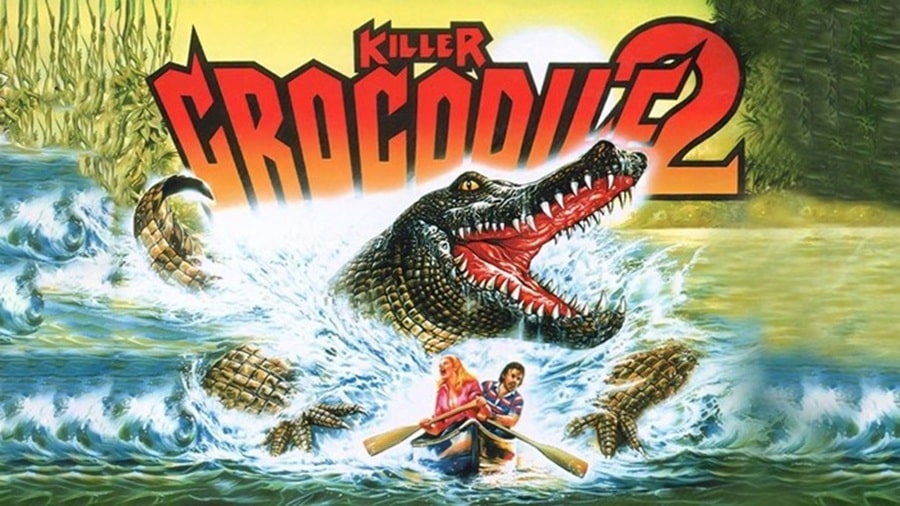 Killer Crocodile 2 (Fulvia Film, 1990)
Killer Crocodile 2 (Fulvia Film, 1990)
My next watch-a-thon is a favourite genre: crocs and gators. Unfortunately, this means the pickings are a bit slim, as I’ve already seen most of them, but I’ve managed to dig up 15 so far (supplemented with a Gila Monster and a couple of Komodos), and I’m sure the intended list of 20 will materialize as streaming services start suggesting titles.
Killer Crocodile 2 (1990) TubiCroc or gator? Crocodile. Again.
Real or faker? A hilarious puppet. The same one.
Any good? A direct follow on from the first story, this time the offspring of the first puppet is doing the chewing. Nefarious types are still dumping toxic waste, thrill seekers are still inexplicably wakeboarding in the world’s muddiest river, and ladies are still getting their kit off for a leaden leading man. Actually, the sexy pillow talk is a highlight. “Don’t you know that fear and near death situations stimulate and heighten a man’s reproductive organs?” Phwoar, steady on, love, you had me at ‘Don’t’.
[Click the images for gator-sized versions.]
The first film featured an unsettling attack on a small boy, but this one ups the ante by having a whole canoe-load of kids get eaten while a nun prays for salvation. Glorious hokum.
6/10
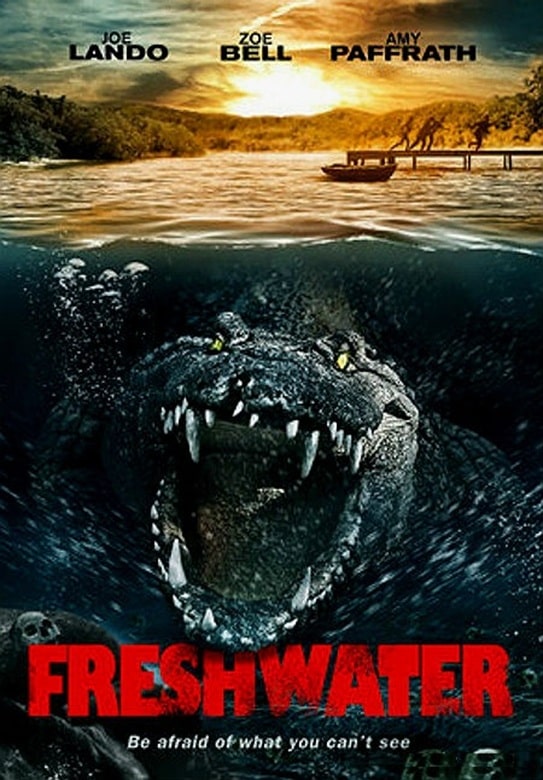
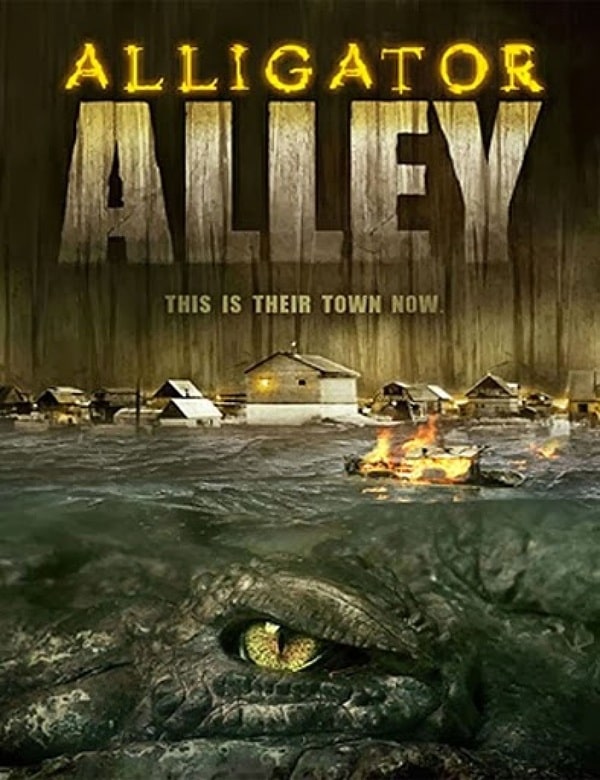
Freshwater (MultiVisionnaire, February 26, 2016) and Alligator Alley (Active Entertainment, 2013)
Croc or gator? Gator, possibly.
Real or faker? Let’s just say, when we do see a gator, it’s rubbish.
Any good? I’m torn, and not in a good way. There’s an awful lot wrong with this one, the script, the directing, the editing, the score (dear God, that score), most of the acting, the effects, and yet it tries something different (no spoilers, but it’s not what I was expecting) and I applaud the ballsy ending.
However, when the intended humor falls flat but your audience laughs at everything else, that ain’t good. Makes for a good drinking game if you are counting poor decisions (the first being to watch this optimistically).
5/10
Alligator Alley (2013) YouTubeCroc or gator? Gators!
Real or faker? Reasonably dodgy CG.
Any good? Also known as Ragin Cajun Redneck Gators, you know exactly what to expect going into this SyFy slice of grilled ham, and yet it upends those expectations with a hearty fart in the face. Toxic moonshine mutates gators into dart firing rascals whose bites turn folks into more gators (I kid you not). It’s all set against the backdrop of a family feud down south, and is as ludicrous as you might imagine.
It’s rubbish, but it’s daft rubbish, which is about as good as it gets these days, so I’m not hating it.
6/10
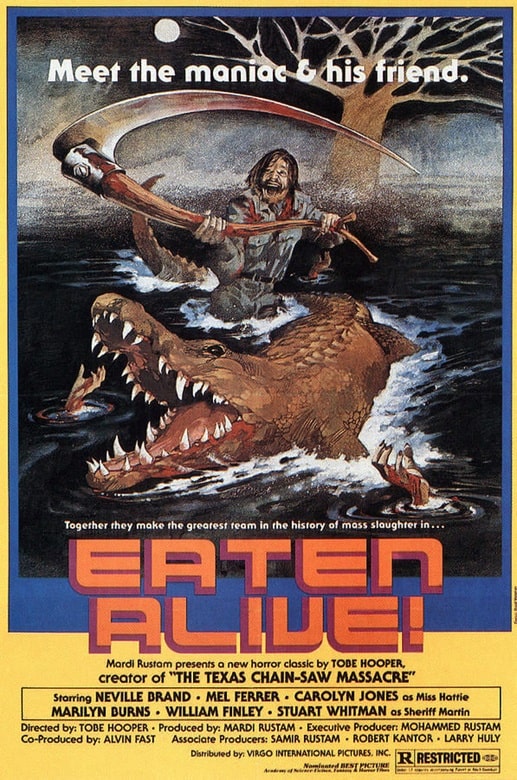
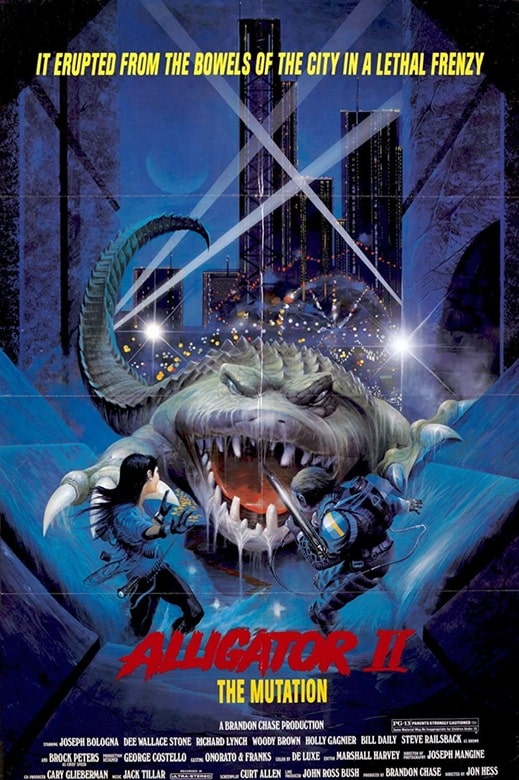
Eaten Alive (Mars Productions, October 18, 1976) and Alligator II: The Mutation (New Line Cinema, June 5, 1991)
Croc or gator? Nile Croc!
Real or faker? Cute papier mache monster.
Any good? Some good has come out of this ill-considered project, for I have finally watched the missing Tobe Hooper film in my life — a film banned in the UK until 1998 as part of Mary Whitehouse’s Video Nasty apocalypse. Though tame by today’s standards, the film does come with a warning for modern audiences as besides a bit of gore, it contains racial slurs and attempted rape.
This is Robert Englund’s first film role, and his big screen intro is “My name’s Buck, and I’m here to fuck.” Funny to think that he was roomies with Mark Hamill at the time, who was busy on his own little film.
The entire film is shot on a soundstage, and although the grimy motel is impressive enough, the exterior shots have an unearthly quality to them, surreal, dreamlike, bathed in red neon and resembling the last days. It’s atmospheric as all heck, with killer sound design, but it might be an uncomfortable watch for some (women are only present to get undressed). Neville Brand as the Norman Bates-ish ‘Judd’ is excellent, and the croc itself gets to do some fun chomping.
8/10
Alligator 2: The Mutation (1991) YouTubeCroc or gator? Alligator.
Real or faker? Stock footage and a rubbish puppet.
Any good? 11 years after the excellent and enjoyable first movie, someone decided to remake it, but make it boring. This film is missing two key ingredients, Robert Forster and a decent alligator.
Richard Lynch, Steve Railsback and Dee Wallace are welcome additions, but even they can’t save this dull ordeal. The story is the same as the first — a sewer alligator grows big and mean due to toxic waste, a corrupt businessman throws a party, rinse, repeat. However, where the first film kept its tongue in its cheek and actually showed us a big ol’ alligator, this one relegates its rubbish effects to the dark of the sewers, ensuring we see nothing for most of the film. Dull.
4/10
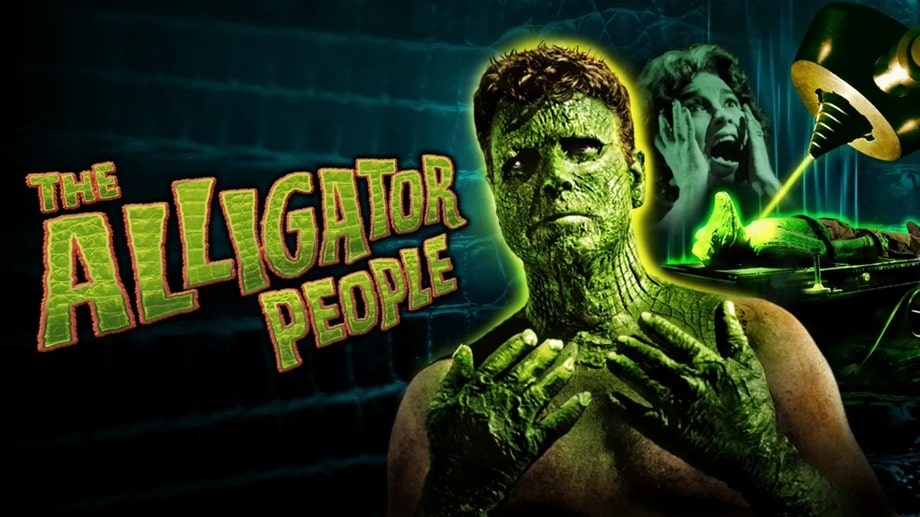 The Alligator People (20th Century Fox, July 22, 1959)
The Alligator People (1959) Disney+
The Alligator People (20th Century Fox, July 22, 1959)
The Alligator People (1959) Disney+
Croc or gator? Alligator people!
Real or faker? Real gators and some great makeup.
Any good? One of those classics that somehow passed me by — I suspect the hokey still used in every book didn’t inspire much confidence in me — but I was horribly mistaken. Far from being the B-movie cheesefest I was expecting, it was surprisingly compelling, with a decent plot, lovely writing (the narration is poetic) and makeup by none other than Ben Nye and Dick Smith!
Lon Chaney is creepy as all heck, Beverly Garland is lovely, and the whole affair drips atmosphere and dangly moss. There’s a bit of abuse aimed at some (real) gators, so animal lovers beware, but I ended up both enthralled and charmed and I’m very happy to finally tuck this one away.
8/10
Previous Murkey Movie surveys from Neil Baker include:
What a Croc, Part I
Prehistrionics
Jumping the Shark
Alien Overlords
Biggus Footus
I Like Big Bugs and I Cannot Lie
The Weird, Weird West
Warrior Women Watch-a-thon
Neil Baker’s last article for us was What a Croc, Part I. Neil spends his days watching dodgy movies, most of them terrible, in the hope that you might be inspired to watch them too. He is often asked why he doesn’t watch ‘proper’ films, and he honestly doesn’t have a good answer. He is an author, illustrator, outdoor educator and owner of April Moon Books (AprilMoonBooks.com).
Meet Marble Grant
Just a quick little post to let you all know that Dean’s Kickstarter for his marvelous Marble Grant stories has just gone live. There’s a lot of goodies here in addition to the books. You’ll find discounted workshops and a lot of short stories.
Take a look at the video I finished over the weekend, and see if Marble Grant is right for you.
Hidden Legacy and Kate preorders on Graphic Audio
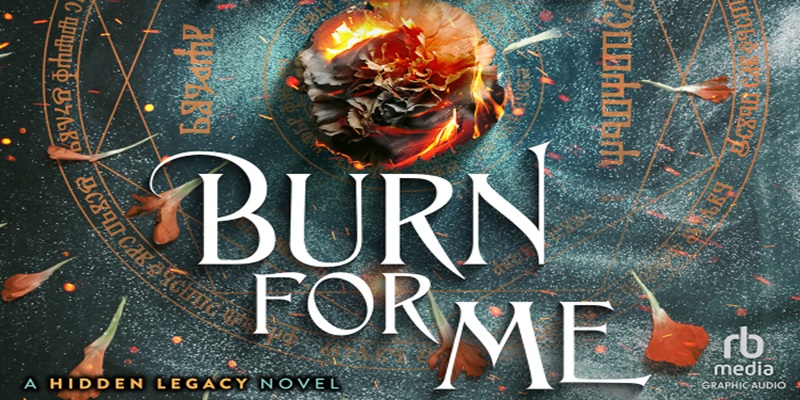
I did promise you last week that I would have more surprises from Graphic Audio and I am here to deliver.
Magic Triumphs has an official release date and a preorder link here – the 19th of May! Audible and all other third party retailers will have a live preorder sometime in the next couple of weeks.
Nora and team are working hard to ensure we’ll have the complete main series Kate by the time summer rolls around – we’ve just gotten Magic Shifts and Magic Binds is also on preorder for March here.
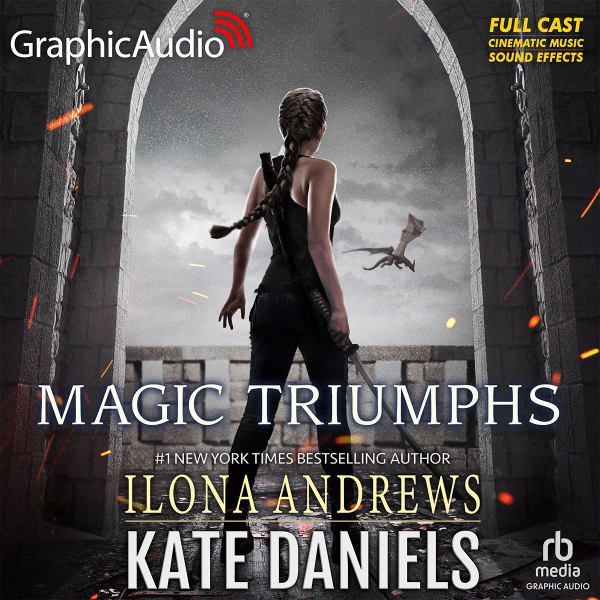
The last installment will be a tour de force for all the voices we’ve come to know and love, and the majesty of those final battles will be done full audio cinematic justice.
And that’s not all!
The Hidden Legacy series has started recordings and we have a release day for Burn for Me as well- 25th of April! You can already preorder the book on the Graphic Audio website here. You will be able to order on Audible, Chrip, Hoopla etc in the next couple of weeks.
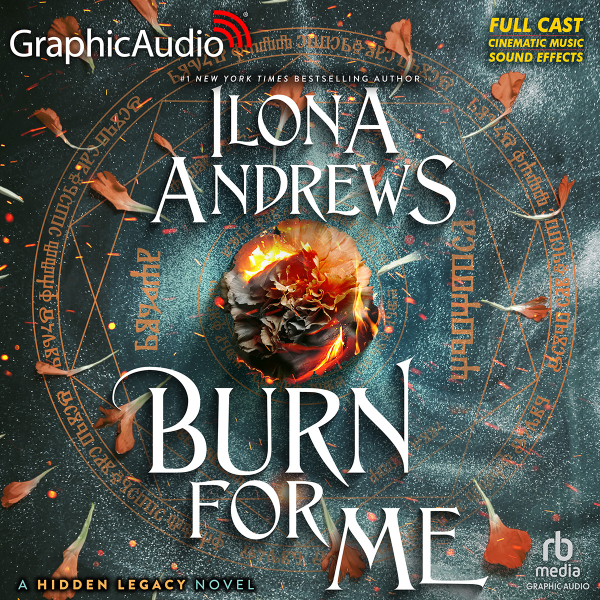
The director for the Hidden Legacy series is Megan Hastie. Megan has a strong background in sound design, and comes heartily recommended by Nora, with whom she has worked before, including on the Innkeeper Chronicles and Kate adaptations, so she is in no way a stranger to the world of Ilona Andrews.
Megan and the lovely people at Graphic Audio had creative meetings with House Andrews before the holidays, and the authors had input in the casting choices for the main roles. The usual collaboration when it comes to adapted script feedback, pronunciation, fan-favorite scenes, etc will also continue. We are in very safe hands!
And speaking of, because I’ve been listening to Magic Shifts on repeat since it came out on Friday, I wrote to Nora and she generously sent me another snippet to share. Behold, our newest prezzie:
Butt + Bee snippet in Ghastek’s office hehehe.
For those who aren’t yet fans and might have some questions, Graphic Audio produce full-cast dramatic adaptations of the books, with each character being interpreted by a different actor, with immersive sound effects and cinematic music. Their tagline is “A movie in your mind!” and I believe most of us agree they deliver on it.
I have covered in more detail how to buy and the accessibility of the GA app in this post, which you can also supplement with the Graphic Audio Help FAQ on their website.
Also a reminder that adaptation rights for a series/book are sold to Graphic Audio upon them showing interest in it, not upon author commission, and the company make their own business decisions. Whilst there is a lot of collaboration and advice about pronunciations, characters and canon etc, House Andrews don’t control any of the scheduling or creative choices.
It is an entirely separate business venture, and it will not be replacing the traditional one-narrator audiobook format, which is produced directly by either House Andrews or the publishing house on each book release.
The post Hidden Legacy and Kate preorders on Graphic Audio first appeared on ILONA ANDREWS.
Teaser Tuesdays - The Spellshop
 Kiela never thought the flames would reach the library. She was dimly aware that most of the other librarians had fled weeks ago, when the revolutionaries took the palace and defenestrated the emperor in a rather dramatic display.
Kiela never thought the flames would reach the library. She was dimly aware that most of the other librarians had fled weeks ago, when the revolutionaries took the palace and defenestrated the emperor in a rather dramatic display.(page 1, The Spellshop by Sarah Beth Durst)
---------
Teaser Tuesdays is a weekly bookish meme, previously hosted by MizB of Should Be Reading. Anyone can play along! Just do the following: - Grab your current read - Open to a random page - Share two (2) “teaser” sentences from somewhere on that page BE CAREFUL NOT TO INCLUDE SPOILERS! (make sure that what you share doesn’t give too much away! You don’t want to ruin the book for others!) - Share the title & author, too, so that other TT participants can add the book to their TBR Lists if they like your teasers!
A HOUSE with GOOD BONES by T. Kingfisher
Free Fiction Monday: Handfast
When Ry gave her the magic gun, she thought it the most romantic gift she’d ever received. But after his death she had to put the gun in her past or risk losing her future.
Until the day she can no longer keep the gun at bay. It demands answers. Answers only she can find. Answers that involve a ceremony she never fully understood. Until now.
“Handfast” is available for one week on this site. The ebook is also available on all retail stores, as well as here.
Handfast By Kristine Kathryn Rusch
The most romantic gift anyone ever gave me? A gun.
Valentine’s Day, ten years ago. Ryder. God, what a sweet man. Six-three, all tattooed muscle, black hair shorn off that year to accent his dark, dark skin.
We were on the roof of his place, trying to keep candles lit in the cold breeze blowing across the Hudson, eating take-out sushi with custom-made chopsticks clutched in our frozen fingers, sitting on lawn chairs wedged into the ice-covered snow.
Ry gave up on the candles midway through, decided to go to his apartment to get a lantern—he said—and did come back with one. Battery operated, large, already on. And in his other hand, a Tiffany’s blue box big enough for a cake, tied with the ubiquitous white ribbon.
Despite the box, he couldn’t afford Tiffany’s. Not even something small, and certainly not something that large. Even if we could have afforded Tiffany’s, we wouldn’t have bought anything there.
We were militantly anti-ostentation back then. It went well with our lack of funds. But we believed it, acted on it, maybe even looked the other way when someone in a silk suit and shiny leather shoes ventured into the wrong alley, stepping in only when that rich bastard looked to be in trouble for his life—never stepping in to save his wallet.
I opened the box with trembling fingers, stuck the ribbon in my pocket and stared at a small lockbox that looked old and well used.
Ry nodded. He wanted me to open it.
So I did.
And saw the gun.
It wasn’t any old gun.
It was custom-made, silver, and, I later learned, it glowed slightly when its owner touched it. It also designed its own bullets—silver for werewolves, holy-water-laced for vampires, and laser-lighty (filled with fire) for the unknown magical.
I long suspected—and never tested—that the miracle weapon could transform its bullets into whatever the owner imagined.
We handfasted me to the weapon. He claimed he had another one, but I never saw it.
Handfasting required the candlewax (he was planning ahead), a bit of mercury, a touch of burnt almond. And some other magical oil-based concoctions I’m not going to describe, just in case.
And yeah, handfasting—pagan term for wedding. But it also meant a bargain struck by joining hands. I thought then that applying hand to hand-grip was the same thing.
I had no idea where Ry had gotten the weapon or how he learned to control it. I didn’t understand why he gave it to me.
I’d love to believe what he told me that night: He gave me the gun because he loved me.
But that couldn’t have been entirely true, because who gave a gun out of love?
When I pushed the next day, asking the right way—what made you think of me when you saw this?—he said I was so much more talented than he was, I deserved the weapon, and the weapon deserved me. And then, the day after that, he admitted he had one too, and we’d go practice with them, just him and me, Upstate, the next time we had the dough.
There was no next time. There wasn’t even a day after that. Not for Ry.
Someone caught him in our alley, shredded him, took the tattoos as souvenirs. I found him, still alive, barely. But not alive enough to tell me what happened. Or alive enough to let me know he heard me when, stupid me, I told him I loved him for the first and only time.
***
Fast-forward a decade to the winter that never died. Press coverage that year pegged it as the coldest in two decades, blaming arctic air that should’ve lived in Canada but, like any other snowbird, decided to move south.
I had my own place by then, two buildings over, tall enough to get the occasional sunset glinting off the nearby roofs. I liked that: the dying sunlight reached the kitchen of my glorious apartment, just about the time (in the winter at least) I was having whatever it was I scrounged for breakfast.
My apartment: three rooms, hard-fought. Actually purchased when the building went condo just before the damn housing crisis. Now I was—as the pundits so euphemistically call it—underwater, and for once, I gave a damn.
Then I’d come to my place, warded and spelled, with the most comfortable furniture I could find (mostly discards on garbage day, dragged up the elevator, refurbished and softened), and reveled in having a safe harbor, somewhere no one else ever breached. Not anyone, including the post-Ry lovers, the so-called friends, the clients and the hangers-on.
Just me and the silence I’d created, a place to refurbish myself after each day’s hard knocks and scrapes.
Somehow I stopped being militantly anti-ostentation. I was still anti-ostentation—no one would mistake the interior of this place for anything fancy—but I’d grown up enough to have financial entanglements and to adopt some of the trappings of a good citizen.
Protective coloration, really.
I’d needed it.
Back in the day, me and Ry were a team, and he was the stronger. We’d partner up, go after the shadows, fight till dawn, screw till noon, sleep a little, and start over.
Then he died, and I went full-moon batshit crazy searching for his killers, never sleeping, the edges of the world growing jagged and dark, finding clues where none existed, missing clues that’d probably been there, going, going, going until I ended up face-down in an abandoned subway tunnel and no memory of how I got there.
I had to choose, with my face pressed against the oil and the decades-old piss, whether I’d keep going or whether I’d just let it all end.
And weirdly, it was Ry who saved me. Ry, with his crooked half-smile and his embrace of anything dangerous. Ry, who had a tattoo on his left bicep of a bright yellow smiley face holding a sword in one little gloved hand and a dripping scalp in the other, with the word Onward in gothic letters underneath.
That tattoo always made me grin, especially when he flexed it, making the sword move up and down as if the smiley face were marching at a parade.
I saw that tattoo as clearly as if it were in front of me and, instead of regretting the method of its theft, I let out a tiny laugh. That moved the dusty dirt in front of me, and almost made me gag on the stench. Which, for some reason, I also found funny.
I was exhausted and spent, and in some ways, ruined. Completely different than I had been before.
I sat up, then stood up, and staggered my way out of the tunnel, heading back into my life. Which I rebuilt—alone—bit by bit. In the places that had never functioned alone, I built—I trained, I learned, I became.
I stayed in the City. Because the City had taken Ry from me. I couldn’t get him back: Magic didn’t work that way—at least not any kind of magic I chose to participate in. But I could find the missing pieces.
I could find whoever or whatever had killed him.
I could have answers—
Or so I thought. At first. Before I realized that a girl’s gotta eat. A girl’s gotta live. A girl’s gotta move forward.
So I did.
***
And then the winter of our discontent. Valentine’s Day wasn’t a bright spot for anyone. Yet another storm had arrived the day before, canceling flights, snarling traffic, and delaying the all-important flower deliveries to shops that relied on them. By the time the actual holiday rolled around, the City was enveloped in sleet on top of two feet of snow.
I rented an office near the alley where Ry got attacked. The office wasn’t much—third-floor walk-up with a frosted door, frosted windows, and a radiator that clanged to its own tune but at least kept the place warm. I had an actual desk which I got from an office five doors down—a blond wood monstrosity that smelled like old cigarettes, giving the office a slightly musty air, something I actually liked. In keeping with the thirties motif, I kept an open bottle of Scotch in the bottom drawer, although I rarely touched liquor. Any more.
I cribbed an old leather sofa from that same abandoned office, and found two matching desk chairs in the garbage behind my apartment building. The only money I actually spent on furnishing the place was for my chair, which was the most high-tech thing I owned. It had more levers and dials and options than the first (and last) car I ever drove.
The office had no computer or phone or anything remotely resembling office equipment. I don’t write reports. I collect funds up front, and don’t give paper receipts. If I need more money from my clients, I ask them for more. If they refuse to pay, I refuse to work.
I’m not one of those private detectives who works pro bono because the case interests them. I work because I need the money—and if I didn’t work, I’d go back down that crazy subway tunnel, and the overwhelming stench of decades-old piss.
It’s not even fair to call me a private detective. I use the title sometimes because it’s easier than explaining what I do. What Ry and I used to do. What I never stopped doing, after he was gone.
I shove the magic back where it belongs.
Sounds easy, but it’s not. And there are only a few of us that can do it.
By now it should be clear: I wasn’t sitting alone in my office on Valentine’s Day because of the snow. I hated Valentine’s Day with a bloody passion. I tried not to. It wasn’t the fake holiday’s fault I was always so miserable at this time of year.
I usually tried to tell myself that Valentine’s Day had peaked for me that night on the roof, with the lantern and the Tiffany box. And sometimes that worked.
But not on the tenth anniversary. Not as I slogged my way through the snow and sleet, watching inane couples in their finery get out of cabs or stumble out of the subway, pretending the day (night) was perfect after all. Maybe it was the combination—wind, snow, Valentine’s—that caught me.
Or maybe I was finally feeling my age for the first time.
Whatever it was, it convinced me to haul out that open bottle of Scotch the moment I collapsed into my high-tech desk chair. I had had the same open bottle of Scotch for months now, ever since a baby demon with a heart of gold (long story) had slept in my office for two weeks and nursed on the bottle like it was demon-mama’s teat. No way was I ever drinking from that bottle again. So I got a new one—after I found baby demon’s distraught mama and finally reunited the two of them.
Me, an open bottle of Scotch, sleet tapping the frosted glass like werewolf claws. I thought I had the night all planned—when the gun appeared out of nowhere.
The gun. You know, the one from the Tiffany’s box.
Or so I thought at first.
Well, not entirely true, because you don’t think about where a gun came from when it appears right in front of you, business end pointed at your face, trembling as if held by an unsteady hand.
And nothing else.
I set the bottle of Scotch down, then made myself calmly and deliberately screw the cap back on. I would have put the bottle back in the bottom drawer, but the gun’s trembling got worse, and I really didn’t want to get shot just because I was being a neat freak.
I wondered what kind of bullets were in that thing—silver, holy-water-dipped, flaming hot. Damn near any of them would kill me, since I’m just good old-fashioned flesh and blood. I stared at the wobbling muzzle of that gun, then realized I had some control.
We’d been handfasted after all. The weapon belonged to me and I to it, which was probably why it couldn’t go through with the shooting.
I held up my right hand and said in my deepest, most powerful voice, Come to me.
The weapon’s trembling increased, but it didn’t move. My heart moved enough for both of us, trying to pound its way out of my chest.
I tried the command again, and again, the damn gun just shook more.
So, figuring the rule of three, I tried one final time. Join your handfast partner.
The gun stopped trembling. And then it whirled as if pursued, and floated away from me. I sat for a moment, stupidly, then realized that the damn gun didn’t belong to me. It was a different weapon than the one locked in the lockbox I kept in the Tiffany’s box.
I got up and stumbled after the gun. It floated down the hallway, then down the stairs, always staying at chest-height, just as if someone were holding it.
It reached the lobby, bumped out the door (I have no idea how it got open), and into the sleet. I followed, coatless, instantly chilled, and nearly slammed into a couple wearing less clothes than I was, giggling their drunk way out of a nearby bar. They didn’t seem to see the gun, but I couldn’t take my gaze off it.
Because it went into the alley, where Ry died. And then it started banging against the brick wall behind a Dumpster, as if it were trying to get into something.
I wished for gloves. And boots. And a coat. I was sliding on ice, and still the alley had the stench of weeks-old garbage. It didn’t matter how cold or wet something got, the smells remained.
I tried not to look at the back corner, where Ry bled out. It was covered in a snow pile six feet high anyway. The gun kept banging and scraping, and I finally decided to violate one of the major rules of automated magic.
I got between the gun and the wall. The gun kept hitting the same brick, scraping it white. I grabbed the damn thing, surprised that my fingers fit where the mortar should have been.
So I pulled.
The brick slid out easily, and I slid backwards, nearly falling. I caught myself on the edge of the ice-cold Dumpster.
The gun turned itself sideways, shoving its grip into the open hole. It had stopped trembling.
It balanced on the edge of the brick below for just a moment, then toppled downward.
I jumped back, afraid it would go off by accident.
But it didn’t.
It rested on top of the ice as if all the magic had leached out of it. Its color was different too. No longer silver, but a muddy brown instead. I tilted my head, blinked hard, my face wet with sleet.
I wiped my eyes with the back of my hand, smearing the cold rather than getting rid of it.
The gun still looked odd. I figured it actually looked odd—it wasn’t my magical sight that had changed; the gun was different.
So I crouched. And looked closer.
And gasped.
Something had wrapped itself around the grip. Brown and mottled. It took a moment for my eyes to make sense of what I saw.
The word Onward in Gothic script.
Bile rose in my throat.
I nudged the gun with my foot, then managed to flip the weapon over. The image on this side was a distorted yellow, desiccated and faded.
I swallowed hard, my stomach churning.
Then I stood and made a small flare out of my right fingertip. I used the flare to illuminate the hole in the bricks.
Saw shreds, images. Messed on the top like someone had rifled a drawer, and laid flat below, like carefully folded linen napkins waiting for a fancy dinner.
I lost my not-fancy dinner. And breakfast. And every meal for the past week.
Some investigator.
I’d searched for those patches of skin from the very beginning—all six of Ry’s tattoos—knowing his magic lurked in them.
Only, as I braced one hand on the wall, and used the other hand to wipe my mouth, I realized that there were a lot more than six scraps of skin in that wall.
A lot more.
I allowed myself to get sick one final time before hauling out my phone, and calling the only detective at the NYPD who would ever listen to me.
Ryder’s older brother.
Dane.
***
He showed up ten minutes later, wearing a dress coat over an ill-fitting suit, and a this-better-be-worthwhile attitude. He wore his hair regulation cut, and he didn’t have the muscles or the tattoos. Still, there was enough of a family resemblance to give me a start every time I saw him walk toward me. Same height, same build, same general energy.
“Three-hundred dollars up front for dinner,” he said. “Includes five courses and champagne. We’d just finished appetizers.”
“Special girl?” I asked.
“I’m hoping,” he said. “We’ll see if she’s still there when I get back.”
She might be waiting a long time, I thought but didn’t say. I just showed him the open hole in the brick.
“What?” he asked impatiently.
“Just look,” I said, my voice raspy, throat sore, my breath so foul I tried not to face him.
He grabbed his phone and used it like a flashlight, then backed away when he realized what he was looking at.
“What the hell?” he asked.
He peered into that obscene storage space, then looked at me, his handsome face half in shadow.
“How did you find this?” he asked, as if I had created the horror all on my own.
I poked the toe of my battered Nike against the gun.
He turned the phone’s light toward it, saw the desiccated but still visible smiley face, and swallowed hard, then shook his head.
“You’re out here without a coat or hat or mittens, and you’re telling me you just stumbled on this gun?”
He didn’t mention his brother’s skin, wrapped around it, or the fact that there was more shredded skin in that opening.
“No, I’m not saying that.”
Now that he mentioned how I was dressed, I realized just how cold I was. My teeth started chattering. I shoved my hands in the pocket of my jeans, not that it did much good.
“I asked you how you found this?” Dane snapped.
“And I showed you,” I said.
“It means nothing.” His voice went up, echoing between the buildings.
“Only because there are some things you refuse to let me tell you,” I said, matching his tone.
He stared at me, breathing hard. I tried to stay calm, but it was difficult, considering how bad I was shivering.
“Magic?” he asked with a sneer he once reserved for Ry, but had transferred to me since Ry’s death.
I nodded.
Dane rolled his eyes and shook his head. “You think this crap has been here all along?”
I shrugged one shoulder.
“You want to tell me, without talking about magic, how you came down here?”
I sighed. I could have said no, I supposed, but I didn’t. “I followed the gun.”
“And whoever was holding it,” he said.
“I didn’t see who was holding it,” I said.
“Convenient,” he said, “since it looks like Ry’s gun.”
It is Ry’s gun, I wanted to say, but knew better. Because then Dane would ask me how I knew that, and I would point to the layer of skin wrapped around the grip.
“Ry told me he had one,” I said. “I never saw it. How do you know it’s his?”
Besides the skin, I mean, I added mentally. Of course, Dane didn’t hear that.
“Pretty unusual thing, huh?” Dane said. “Ry called it magic. Me, I think it’s some kind of toy, since it supposedly invents its own bullets.”
I ignored that jibe. “He ever use it in front of you?”
“No, he wanted to take me to the range to practice with it, but he….” Dane let out a sigh. “He died before we could go.”
“Who ended up with the gun?” I asked.
“I don’t know,” Dane said. “I never saw it again.”
“So you remember it after ten years?” Lying on the ice, with Ry’s skin wrapped around it, the gun didn’t look that distinctive, at least not to me.
“I’d tell you I recognized it by that lovely silver barrel,” Dane said, “but I didn’t even notice that part at first.”
I waited. I was going to make him say it, the bastard.
“I don’t think we’re going to have to test the DNA on that skin,” Dane said quietly.
I nodded.
“But we might have to on the rest of this stuff in here.” Dane peered at that hole. “Why would the gun turn up now?”
It had been exactly ten years since I got my gun. But I had no idea if Dane knew I had one too, and I wasn’t about to tell him.
“The anniversary’s coming up,” I said.
“Yeah, like I can forget that,” Dane said dryly. He sighed again. “I’m going to call this in. You need to go inside before you freeze solid.”
“What about the gun?” I asked. “Do you think it should go into evidence?”
He looked at me. He knew what I was thinking. Hell, all of New York would have known what I was thinking. The city had seen a lot of news lately about weapons stolen out of the NYPD’s evidence storage.
“You want to pick it up?” he asked.
Of course I didn’t. Neither did he. But he had opened the door, and he was the magic-denier, not me. I reached around him, and with shaking fingers, sorted through the Dumpster until I found a box that wasn’t too junked up. It was a shoebox with some stains along the bottom, but it didn’t smell that bad, so I grabbed it.
I was going to scoop up the gun with the box lid, but I stopped halfway. I didn’t want to mess up that grip. (That tattoo.) So I glanced at Dane. He was watching me closely.
I slid the lid underneath the box, then held the box in my left hand. I turned my right palm upward. Then I concentrated on the gun and hooked it mentally to my right hand. Slowly I raised my hand, and the gun rose too.
Once the gun was a foot off the ground, I crouched, slid the box underneath it, and turned my palm down. The gun bounced into the box, and I slapped the lid on it.
Dane watched me, face gray in the half light. His gaze met mine, but he didn’t say anything. I knew, if asked, he would say only that I slid the box under the gun and scooped it up.
I offered him the box.
He shook his head. “You keep it.”
“There could be evidence here,” I said, taunting him.
He shook his head. “We’ll have more than enough. Now, go inside.”
He didn’t have to tell me twice. I scurried to my building, feeling as if I would never get warm again.
***
So Ry had handfasted to the gun, just like I had.
I carried it up the stairs to my office, noting that the box did have an odor, but I wasn’t sure if the odor came from the Dumpster or that tattooed slice of skin. I didn’t want to think about that either.
Instead, I locked the entire box inside my office safe. Then I went to the ladies room down the hall ostensibly to run warm water on my hands but, in reality, to get whatever was on that box off my skin.
I shivered and shivered, even after I warmed up. The shivering didn’t just come from the cold.
After I’d cleaned up, I grabbed my heavy down coat, my unattractive knit cap, and my gloves. I slipped everything on, locked the office, and headed home.
I needed to know if my own gun was still there.
When I reached the street, the cold returned with a vengeance. It was as if I hadn’t gone inside to get warm at all.
A crime scene unit had the alley blocked off. Dane appeared to have left, and some unis guarded it all. They stared at me as if I were the bad guy. I pivoted, went the other way, and headed to my place.
At least the sleet had stopped, but the sidewalk was slippery. The restaurants along the way—this place was so gentrified now—were filled with well-dressed couples pretending to be happy. And maybe they were over their—what had Dane said? $300 meals? I preferred the take-out sushi eaten with custom-made chopsticks on a roof so cold it made this evening seem like the Bahamas in summer.
I still missed Ry, the bastard. I liked to think I had moved on, but I hadn’t. Not inside. Not where it counted.
I took an elevator to my apartment, and let myself in. The apartment was warm, homey, perfect, just like it had been since I bought it. I closed the door and locked it, then checked the wards just in case.
They were fine.
I peeled off my gloves and tossed them on an occasional table. Then I went into my bedroom and opened the closet.
There, on the top shelf, was the Tiffany’s box. I pulled it down, and gingerly untied the ribbon. I tugged the lid off and looked inside. The lockbox was still there. I opened it too, and stared at the gun, gleaming in the light.
It looked no different than it had every other time I had looked at it. It was a shame I had never used it, a shame that it hid here in the dark, as if it were at fault for Ry’s death.
I ran my fingers across its cool surface. It glowed faintly, in recognition. I wished I knew how to use it. I wished Ry had told me where he had gotten it, why he had chosen a Tiffany’s box to keep it in, what it all meant.
I closed the lockbox, then closed the Tiffany’s box, and retied the ribbon, like I’d done dozens of times over the years. I put the gun on the top shelf of my closet, then closed that door. If only it were that easy to put the gun out of my mind as well.
Something had caused the second gun to come to me. Something had powered it. Something—or someone.
I wouldn’t know what until I knew more about the guns themselves.
I grabbed my cell to call Dane. Then decided I wasn’t going to speak to him on the phone.
I would go to him, wherever that was.
I took my gloves off the occasional table and let myself out of the apartment, using the edges of my magic to track Dane.
It wasn’t hard.
He was at the precinct, at his desk—which, I was certain—was not where he wanted to be.
***
The limestone façade of the three-story precinct building looked dirty against the sleet-shiny snow. Ry used to call it the Home of the Enemy, but he didn’t really mean it. He was always mad at Dane for refusing to acknowledge the magic or the work Ry and I were doing.
The rivalry between them didn’t mask the love they had for each other, though, and I knew Dane had been as torn up over Ry’s death as I was.
I let myself inside, the smell of fear and sweat enveloping me. I took the steps up to the detective unit, and slipped inside.
Nighttime made little difference. There were always detectives poring over files, tapping on ancient computers, or talking tiredly into the phones.
Dane was sitting at his desk toward the back, hands pressed against his cheeks, staring down at some paperwork in front of him. His suit coat was hanging over the back of his chair, and his long dress coat was hanging on a peg on the wall.
I walked over to him and hovered, waiting for him to acknowledge me.
“At least fifteen different skin types,” he said. “And they’re just estimating. Who does that?”
He sounded tired. I guess the possibly special woman hadn’t waited for him after all.
“Not who,” I said. “What does that?”
“Yeah, some kinda animal,” he said more to himself than to me. Because we both knew that he was deliberately misunderstanding me.
It was a good question, though. Demons shredded skin, but they used the unbelievable pain from the process to increase their own power. There were lots of creatures from all sides of the magical divide that consumed skin, mostly as food, and a handful that took the magic from tattoos.
But nothing native to New York. Because all of the native creatures destroyed the skin when they did what they did.
I knew of nothing that took tattoos like trophies.
“Was everything—” I couldn’t bring myself to say skin fragments. “—tattooed?”
“Yeah,” he said quietly. “Mean something to you?”
I shook my head, but he wasn’t looking up. Maybe he took my silence as an acknowledgement.
“Do you know where Ry got the gun?” I asked.
Dane finally raised his head. He seemed to have aged years in the past few hours. He seemed surprised by the question.
“There were two,” he said. “They belonged to my parents. I figured he had given one to you.”
My cheeks heated. I had never told Dane about the gun. I hadn’t told anyone.
Dane was frowning. “He was going to—you know—ask you to marry him. He was all goofy about it. He even found a Tiffany’s box, because engagement rings come in Tiffany boxes. He thought you’d get it.”
I thought we didn’t believe in marriage. I thought marriage was so…middle class, so ostentatious.
I had missed the point.
Why me? I had asked Ry.
Because I love you, he had said, so sure, so certain.
And then, at my confusion, he had shrugged, said he was cold, and we’d better hurry. Still, we handfasted me to the gun. My gun. And his matched.
Like wedding rings.
Son of a bitch.
“Did your parents have wedding rings?” I asked.
“Oh, yeah,” Dane said, “but my folks were pretty traditional. They wanted the guns to go to me and Ry, like we were supposed to split up the rings.”
Dane leaned back, closed his eyes for a minute, shook his head, then added, “I was the only sane one. The only one who didn’t see little sparklies in the universe or dark things crawling out of corners. My folks were so disappointed…”
Then he rocked forward and opened his eyes.
“I thought you knew,” he said again, but I wasn’t sure if he was talking about the guns or his parents or all of it.
I shrugged, pretending at a nonchalance I didn’t feel. “What were the guns for?”
“Monster hunting,” he said sarcastically.
I nodded, not going there.
“Thanks,” I said, and threaded my way through the desks.
“Hey,” he said. “You need help?”
Not your kind of help, I nearly said. Instead, I shook my head. “You guys are doing it all.”
And as I walked out, I realized that was true. After I had come to my senses, I left the investigation in the hands of the police.
Even when I had known that whatever killed Ry hadn’t been human—at least, by my definition. Maybe by Dane’s.
But not by mine.
***
The guns had history, and I needed to find it. I could look in moldy books or try to find something accurate online. Or I could ask the guns themselves.
I didn’t want to ask the one with Ry’s tattoo wrapped around its grip. I wasn’t sure who or what would answer me.
And I didn’t want to find out.
So I walked back to my apartment, and got my gun down a second time.
Everyone describes silver as cold, but it’s not. Especially when it’s been indoors, and the endless winter continued outside. The gun was warm against my hand, the silver never needing polish.
I wrapped my hand around it, saw—
Ry, grinning as he watched me open the box…
I made that image disappear, saw—
Something huge and scaly, looming over a pair of sleeping boys, then a bright white light zinging out of the muzzle, and the huge, scaly thing exploding into a thousand little pieces…
I shook my head, smiled a little, saw —
Hands with two matching rings, clasped, each around the grip of a different gun. “With my heart, I hold you,” a male voice so like Ry’s said. “With my soul, I touch you…”
It was a handfasting ceremony, only of a kind I’d never heard of. With the guns in the middle.
Marriage, the old-fashioned way.
I rubbed my eyes with my thumb and forefinger. Then frowned, thought of an experiment, and decided to try it.
I set the gun on top of the box.
Then I went into my kitchen, and thought, Join your handfast partner at the gun itself.
After five minutes, it wobbled its way toward me, muzzle pointed at my heart, trembling like Ry’s gun had.
Find your box, I thought, and the gun wobbled its way out the door. I followed it, as it returned to the very place it had started.
I picked the box up and wrapped my arms around it.
Anniversaries had power.
I had thought the gun came to me at the anniversary of Ry’s death.
The gun had come to me at the anniversary of our love—the marriage he had tried to give me, ten long years ago.
***
With my gun in my shoulder holster, I went back to the office.
I doubted I would ever get warm, even though I was wearing my coat, thick gloves, and my hat. I was cradled in the heart of a long, cold winter, and I might as well embrace it.
Ry’s gun was inside the safe, the remains of my favorite tattoo still attached to the grip.
First, I put my gun on the desk. Then, gingerly, I picked up Ry’s.
He laughed.
I took my hand off the grip, shaking.
Then touched it again.
I don’t care how dark things get, he said. We’ll always have each other.
As if he hadn’t left. As if he were still here.
I set the guns beside each other, and they started to glow. If they were real guns—real as in the way Dane defined guns—I would be fleeing now, expecting some kind of weird explosion.
But I was curiously unafraid.
The guns glowed and locked to each other. The tattoo grew into an entire man.
Ryder.
See-through, but there.
“I missed you,” he said.
I didn’t care if he was real or not. “I missed you too.”
“I wasn’t sure you’d understand,” he said. “We never finished the ceremony.”
“I know,” I said.
He nodded, reached toward me, his hand going through my face. I felt nothing, not even a rush of wind.
And oh, how I wanted to.
“What happened?” I asked, because I had to, because I had a sense time was short.
“Demons,” he said, and his image flickered.
He glanced at the guns. The glow was fading.
“No,” I said.
“I love you,” he said.
“I love you too,” I said. “Stay.”
“I wish.” His voice was faint. “Balance the scales…”
And then he was gone.
Again.
The son of a bitch.
***
I felt it—the batshit crazy. It was coming back, or maybe it had never left. I could go after everything, clean up everything, fight everything—and be consumed.
Or I could stand up.
Fight.
Figure it out.
The guns didn’t glow any more. The tattoo was gone.
I touched Ry’s gun. It was cool. So was mine.
Balance the scales.
Demons—and skin.
I let out a breath, grabbed both guns, and headed to the alley below.
***
No crime scene tape. No footprints in the snow. No tire marks where the crime scene unit had parked their van.
The brick was back in place.
I walked to it, touched it, felt edges, still there. The hiding place, still there.
Son of a bitch.
“Finally,” he said, his voice echoing between the buildings.
I turned. He looked bigger, eyes glowing ever so slightly red, Ry’s face covering his imperfectly, five tattoos glowing on his scaly skin.
Saw—in my mind’s eye—two boys, sleeping, a demon hovering over them, exploding in the dark, and scales raining down—on the oldest boy, the one closest to the door.
“Your parents took your magic away from you,” I said.
“They thought they could,” Dane said, his voice deeper, more echoey. “They took the wrong magic.”
They took the good magic, leaving the scales.
Balance them, Ry had told me.
“You killed him,” I said.
Dane didn’t answer me, but the tattoos glowed. The death hadn’t been intentional. I knew that, or Dane wouldn’t have crumbled like he had. They had had a fight—over the guns?
“What do the guns have to do with it?” I asked.
“One of them is mine,” he said.
“Why didn’t you take Ry’s after he died?” I asked.
“I couldn’t find it. But you found it. Thank you,” he said. “Now, give it to me.”
I had no other weapons. I hadn’t expected to fight demons tonight. I wasn’t really in the fighting and slaying business any more. Just the investigating, resolving business.
I pulled Ry’s gun out of my pocket. My hand trembled as I gave the gun to Dane.
He took it, looking surprised at the ease.
“I never realized you were this logical,” he said.
“You never knew me,” I said. Which was fair: I never knew him either.
And I had dismissed Ry. Ry, who had called Dane “The Enemy” right from the start.
Dane grinned. “I like you, you know.”
I nodded, as if I cared. He looked down at the gun, and weighed it in his hand, as if it were something precious.
Which it was.
Join your handfast partner, I whispered.
The gun in Dane’s hand trembled. He held it tightly. The tattoos on him—Ry’s remaining tattoos—glowed.
Then peeled off, one by one, each fastening itself around the gun.
For a moment, there were two men before me, one thinner, less substantial, the other glowing red, the gun between them.
My gun had found my hand as well—and I didn’t remember grabbing it. Then I realized it had heard the same command, thought the command was its.
I knew what kind of bullets demons took, but I wasn’t sure I wanted to shoot Dane—not with Ry fighting him for the gun.
They struggled, the ice melting beneath their feet, the heat of Dane’s evil warming the entire alley. The gun remained between them and then—
Something popped as if a bubble had burst.
Ry staggered backwards, substantial, bleeding (bleeding!!!), and falling, holding his gun.
Dane, dripping scales, reached for the gun and without thinking, I imagined white light—bullets—heading toward him.
They did, shooting out of my gun and hitting his torso.
I reached down, grabbed Ry, pulled him backwards with me, away from the white-and-red glowing demon-man in the center of that alley. We made it behind a stupid snowplow-created pile of snow when Dane exploded, bits raining everywhere.
Except on us.
Balance the scales.
Not just the scales of justice. The scales of a demon, returning where they belonged.
I wrapped my arms around a bleeding, warm, living man.
“Ry,” I said.
“Took you long enough,” he muttered.
“You didn’t explain—”
“No excuses,” he said, and then he passed out.
***
I had no story for the ambulance attendants. I had no story for the cops. I pled ignorance, lost memory, frostbite…I don’t know. Those lies are gone, along with any trace of Dane.
Ry thinks Dane died that night ten years ago, and somehow his demon self managed to get to Ry, so that Ry’s power would keep them alive.
But I think—the magic suggests it—that Dane died a lot longer ago than that. Maybe the night of the demon attack, the ones the gun stopped.
Because demons can create hallucinations, images, visions, like the crime scene. How easy for one boy to die and feed a dying demon, keeping it alive, just barely, waiting for the right opportunity to grow into something stronger.
From the moment I met him, Ry said he distrusted Dane. I thought that strange for brothers. But it wasn’t. It was the man reacting to something he barely remembered from his own childhood.
Ry doesn’t agree.
But it doesn’t matter.
Because we’ve done purges. We’ve saged the entire alley. We’ve warded it and cleansed it. We invited old friends to do the same.
Dane’s gone.
And Ry’s here.
And it’s no hallucination or vision.
The most romantic gift anyone’s ever given me was a gun. And a handfast.
And a future.
Together.
At last.
____________________________________________
“Handfast” is available for one week on this site. The ebook is also available on all retail stores, as well as here.
Handfast
Copyright © 2021 by Kristine Kathryn Rusch
First published in Streets of Shadows, edited by Maurice Broaddus and Jerry Gordon, Alliteration Ink, September 2014
Published by WMG Publishing
Cover and Layout copyright © 2021 by WMG Publishing
Cover design by WMG Publishing
Cover art copyright © Fixzma/Dreamstime, 88and84/Dreamstime
This book is licensed for your personal enjoyment only. All rights reserved. This is a work of fiction. All characters and events portrayed in this book are fictional, and any resemblance to real people or incidents is purely coincidental. This book, or parts thereof, may not be reproduced in any form without permission.
It’s Hughday!
Hey guys. Do you remember when I said this in a blog post?
So, for the foreseeable future, we are going to have something fun here on Friday. Something that will give you a break from the constant stress and daily grind. For now, it’s Hughday. Some Fridays, it might be something else.
What this meant: there may or may not be a snippet of Hugh on Friday. There will be something fun on Friday. It might be Hugh. It might be other free fiction. It might be a fun quiz or a merch giveaway.
What some people read: there will absolutely, definitely be Hugh snippet every Friday, and it’s not here. WHERE THE HELL IS IT?
You know I love you, but please chill. We are human beings, with some health problems at the moment, and while we are doing our absolute best to be productive, sometimes life gets in the way.
Especially with this book, the progress is slow, because we are having to backtrack and add/change things. It’s a complicated story, and it is a sequel. So please mentally prepare yourself that there will be Fridays where you get a funny story or a quiz instead.
::hug:: We well get through this week together. Let’s start with cute squirrels.
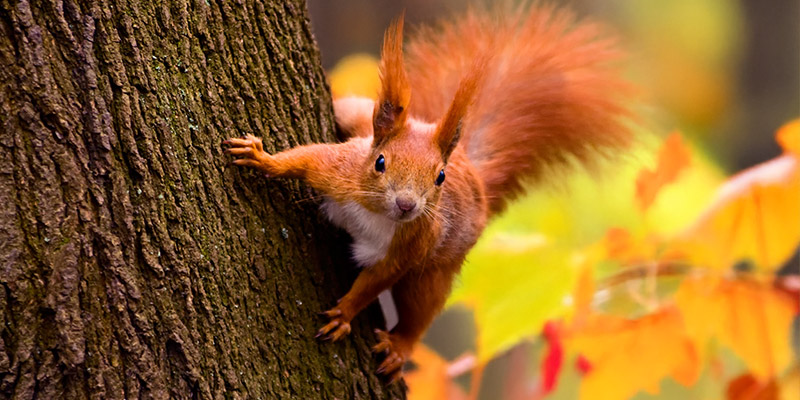 Chapter 2 Part 1
Chapter 2 Part 1
Thud-thud-thud.
Elara’s eyes snapped open.
In her dream she was trying to figure out why the lavender was dying, and as she crouched in the herb bed, a squirrel ran up and hit her head with a wooden mallet.
Thud-thud-thud.
Only one person in this castle knocked on her door like that.
“What do you want, Hugh?”
“Open the door,” he growled.
Her head felt like someone stuffed it with wet cotton. She wanted to go back to sleep.
“It’s the middle of the night and I’m tired.”
“Elara, open the damn door.”
She groaned, kicked the blanket off, pulled a robe on, and marched to the door, flicking the lamp on in passing. When the magic fell, her powers went with it. Sometimes she didn’t mind, but right now every iota of her attention was directed at keeping the plants alive. She needed her magic. Without it, with all of her senses dampened, she felt helpless. It made her listless, tired, and irritable, and Hugh seemed to be on a mission to irritate her further.
Ever since Monday, he kept turning up in unexpected places when she happened to be there. Yesterday he showed up just as she was about to settle down for the night to debate whether or not they should repair the outer pasture wall. When she pointed out that it was outside of his duties, he claimed the broken fence was a security risk. He was incredibly obnoxious about it, too, and she had to resist the urge to brain him with something heavy before finally shutting the door in his face.
What had gotten into him?
Elara swung the door open. He stomped inside, pushed the door shut, and leaned against the table, looming like some dark wraith. She realized he was completely dressed. Alarm pierced her.
“Mrogs?”
“No.”
She almost sagged in relief, then remembered he was still there.
“What is it?”
He fixed her with his stare. His eyes were blue and dark.
“What kind of a druid is Dugas?’
She blinked. “What?”
“Is Dugas a dusk druid?”
“You came here at-” she glanced at the clock on the wall “-two in the morning to ask me what kind of druid Dugas is? What is wrong with you? Are you bored, Preceptor, or do you enjoy annoying me?”
His face was grim. “Answer the question.”
She dropped into a chair and rubbed her face trying to wipe some of the fatigue off. “He doesn’t like labels.”
“What does that mean?”
“It means Dugas will do whatever is needed to keep us safe.”
“Us?”
She waved her hand. “Us, the Departed, the Iron Dogs, everyone here and in the village. Us.”
“Would he ever betray you?”
“Absolutely not. Why are you asking me these things?”
He stared at her for a long moment, pulled a Polaroid from inside his jacket, and handed it to her.
She took the picture. Animal bones arranged in an odd pattern lying in a shallow grave of sorts… She’d never seen anything like it. How strange.
She squinted, trying to make out the minor details. “Are they bound with wire?”
“Twine.”
“What kind?”
“Natural fiber. Bone beads.”
“Where is this?”
“Less than a mile north of here. It’s laid out by a large oak, and whoever made it used wolfsbane to cover the scent. The twine was wrapped around the oak as well.”
The presence of the oak was a tell, so he defaulted to a druid. She would have too. A witch would’ve left an offering and there would be other materials, like herbs and stones. There were other European neo-pagans out there, but most of them associated the oak with the god of thunder: Thor, Perun, Zeus… It was a large tree that was frequently struck by lightning, a symbol of longevity and masculine power and vitality. Neo-pagans would’ve left offerings, gifts, maybe ribbons, but not a shallow pit that looked like a mass animal grave. Bones and lightning just did not go together.
The oak was a crucial part of many Native American spiritual traditions, but they wouldn’t have dug a hollow and filled it with bones either.
No, this felt like the deeper side of druidism. Unease stirred inside her.
I don’t want this. There is already so much on my plate. It’s full and overflowing.
“Dugas…” Hugh started.
She shook her head. “He wouldn’t have used wolfsbane. Baile is his druidic domain. Our druid doesn’t need to hide here.”
She put some emphasis into that our. The sooner he began thinking of her people as his, the better off they all would be.
“In that case, why don’t we ask him what he thinks about it.”
He phrased it like a question, but it didn’t sound like one. A familiar irritation flared inside her. He thought he could give her orders. She needed to cure him of that mistake.
Hugh sacrificed himself for their sake, she reminded herself. He had climbed on his white horse, told her to shut the doors behind him, and rode out of the castle to pretty much certain death, all to keep them safe. She had repaid that debt, but still, it bought him a little more patience.
Elara sighed. “We can’t ask Dugas.”
“And why is that?”
“Because the herbs are dying.” It tore out of her with more force than she intended. “We lost two of the twelve greenhouses. The second crop of borage is gone. Oregano is sickly. It even affected mint and lavender. Mint is damn unkillable. As long as you have water and sun, it spreads like a plague, and yet it’s withering at the root as if something is draining it and we don’t know why.”
“I’m sorry.”
She was ready for questions or demands, but not for that. For a moment, she simply stared at him.
“Thank you.”
“Dugas?” he prompted.
“Took soil samples to Lexington yesterday morning. There is a lab there and he wants to consult the Lexington Grove to see if they can sense something we can’t.”
“So, this could be one of his apprentices.”
And they were back to suspecting her people bit. Our people. She couldn’t very well demand he stick to it if she wasn’t meeting him halfway.
“It’s difficult for me to imagine that one of our people could be doing this.”
“But it is possible?” That was a question.
“Yes,” she admitted. “It is possible. Our people have free will. One of them could’ve done this.”
He focused on her. “Could one of the Remaining have done this?”
“No.”
“Why?”
“Because the Remaining are witches, Hugh. When I left, I took all of the druids with me.”
“At some point I’m going to need an explanation,” he said. “About the Remaining and the Departed. All of it.”
Something inside her kicked like an angry horse. They had kept their secrets for so long. The very idea of talking about it with him made her recoil. She wasn’t ready to cross that line.
“I’ll think about it,” she said.
His face was unreadable. “How many druids do we have?”
“Three hundred and forty-eight.”
“So the chances of this being the work of our druids are high.”
She didn’t know what to say to that.”
“When will Dugas be back?”
She shrugged. “A few days. Definitely by Monday.”
“Why Monday?”
“Thanksgiving, Hugh. We celebrate it as a harvest festival on the last day of November. We already missed most of Samhain and Halloween rites because of the mrogs and Landon Nez. We must have Harvest Day. It must be big and bright and full of food and warmth. The winter will be cold, the herbs are dying, and we are still mourning our dead. The people need this in the worst way.”
He nodded. “Would you like to see the bones?”
She would’ve like to crawl back into bed.
“It can wait till daylight,” he said.
That did it. “I’ll get dressed. Let’s get Savannah, too.”
He nodded and stayed where he was.
“Leave, Hugh. I need to get dressed.”
For a moment he looked like he was going to say something, then he went to the door, stepped out, and shut it behind him.
The post It’s Hughday! first appeared on ILONA ANDREWS.
Monday Musings: Here We Are
We woke this morning to a snow squall, something that happened with ever-decreasing frequency during our years in Tennessee, as climate change made the warm South even warmer. Here in New York, during the winter months, snow is still the default when there’s precipitation, and I love that. I have missed snow and don’t mind paying the plow guy or dealing with snow on the walkways and driveway. The beauty of an early morning snowfall more than makes up for the inconveniences.
We have bird feeders up now, and they’ve drawn in a variety of species, including several species of sparrow, goldfinches and cardinals, chickadees and nuthatches and woodpeckers. They have also drawn the attention of local hawks, who seem to view our feeders as an all-they-can-eat avian buffet. We have a Cooper’s Hawk who frequents the yard, a pair of Red-tails who come around quite often, and, as of yesterday, a gorgeous Red-shouldered Hawk. Our turkey flock continues to wander through the yard now and then, as does a beautiful red fox. A couple of weeks ago, while driving past the farm that borders our property on the western edge, I spotted a young Peregrine Falcon perched on a telephone pole, hungrily eyeing a flock of doves.
I haven’t written in this blog for a few weeks, and in a way what you’ve just read is why. I am working again, we have settled into a routine of sorts. The house still needs a good deal of work, and we’re getting around to that slowly, steadily. We are enjoying this setting immensely. We’re eating fun foods and finding new stuff to stream. We’re spending lots of time with my brother and his family, who live close by, and lots of time with my college roommate and musical partner and his wife, who also live maybe 20 minutes from here.
Life is comfortable and peaceful and, I will also admit, a tiny bit boring. Not to me, mind you, but I can definitely see where it could seem that way to those on the outside. We traveled a lot last year. This year we’re planning to (mostly) stay put and work on our new place. The past several years have been full and fraught, difficult beyond words at times, and at other times so frantic as to be exhausting. This year won’t be like that. Not if we can help it.
And so, yeah, I have struggled to post. I don’t want to bore. I don’t want to repeat material from old posts.
I continue to grieve for my older daughter. I’ll never stop. But I feel I have made that grief part of my life, part of who I am now, and honestly, I wouldn’t have it any other way. I don’t feel the same need to write about it that I felt last year. And I think many grew tired of such posts. Grief is part of me, but it does not — should not — define me.
I don’t really want to think about the slow-motion disaster unfolding in our nation’s capital. This administration’s attempts to subvert the Constitution and undo a century of progress on Civil Rights, environmental protection, social justice, and a host of other worthy goals is not something upon which I care to dwell. I am too weary to engage in online flame wars with troglodytes and nazis. At some point, I’ll grow angry enough to write a political screed or three, but not now.
And at some point, I am sure, I will have much to say about new writing projects. For now, though, I’m merely editing, and enjoying quiet, productive days in my new work space.
All of this feels healthy, and deeply appropriate for this current stage of my life. None of it makes for exciting reading (or writing). I will do my best to post as I can, to come up with things to say that make something worth reading out of our mundane-albeit-cozy existence. But to those who know us and care about us, please be assured that we are doing well. Better than we would have thought possible a little over a year ago. Some days are harder than others. But we are where we ought to be, physically and emotionally. It’s hard to ask for more.
Wishing all of you a wonderful week.

Monday Musings: Here We Are

 We woke this morning to a snow squall, something that happened with ever-decreasing frequency during our years in Tennessee, as climate change made the warm South even warmer. Here in New York, during the winter months, snow is still the default when there’s precipitation, and I love that. I have missed snow and don’t mind paying the plow guy or dealing with snow on the walkways and driveway. The beauty of an early morning snowfall more than makes up for the inconveniences.
We woke this morning to a snow squall, something that happened with ever-decreasing frequency during our years in Tennessee, as climate change made the warm South even warmer. Here in New York, during the winter months, snow is still the default when there’s precipitation, and I love that. I have missed snow and don’t mind paying the plow guy or dealing with snow on the walkways and driveway. The beauty of an early morning snowfall more than makes up for the inconveniences.
We have bird feeders up now, and they’ve drawn in a variety of species, including several species of sparrow, goldfinches and cardinals, chickadees and nuthatches and woodpeckers. They have also drawn the attention of local hawks, who seem to view our feeders as an all-they-can-eat avian buffet. We have a Cooper’s Hawk who frequents the yard, a pair of Red-tails who come around quite often, and, as of yesterday, a gorgeous Red-shouldered Hawk. Our turkey flock continues to wander through the yard now and then, as does a beautiful red fox. A couple of weeks ago, while driving past the farm that borders our property on the western edge, I spotted a young Peregrine Falcon perched on a telephone pole, hungrily eyeing a flock of doves.
I haven’t written in this blog for a few weeks, and in a way what you’ve just read is why. I am working again, we have settled into a routine of sorts. The house still needs a good deal of work, and we’re getting around to that slowly, steadily. We are enjoying this setting immensely. We’re eating fun foods and finding new stuff to stream. We’re spending lots of time with my brother and his family, who live close by, and lots of time with my college roommate and musical partner and his wife, who also live maybe 20 minutes from here.
Life is comfortable and peaceful and, I will also admit, a tiny bit boring. Not to me, mind you, but I can definitely see where it could seem that way to those on the outside. We traveled a lot last year. This year we’re planning to (mostly) stay put and work on our new place. The past several years have been full and fraught, difficult beyond words at times, and at other times so frantic as to be exhausting. This year won’t be like that. Not if we can help it.
And so, yeah, I have struggled to post. I don’t want to bore. I don’t want to repeat material from old posts.
I continue to grieve for my older daughter. I’ll never stop. But I feel I have made that grief part of my life, part of who I am now, and honestly, I wouldn’t have it any other way. I don’t feel the same need to write about it that I felt last year. And I think many grew tired of such posts. Grief is part of me, but it does not — should not — define me.
I don’t really want to think about the slow-motion disaster unfolding in our nation’s capital. This administration’s attempts to subvert the Constitution and undo a century of progress on Civil Rights, environmental protection, social justice, and a host of other worthy goals is not something upon which I care to dwell. I am too weary to engage in online flame wars with troglodytes and nazis. At some point, I’ll grow angry enough to write a political screed or three, but not now.
And at some point, I am sure, I will have much to say about new writing projects. For now, though, I’m merely editing, and enjoying quiet, productive days in my new work space.
All of this feels healthy, and deeply appropriate for this current stage of my life. None of it makes for exciting reading (or writing). I will do my best to post as I can, to come up with things to say that make something worth reading out of our mundane-albeit-cozy existence. But to those who know us and care about us, please be assured that we are doing well. Better than we would have thought possible a little over a year ago. Some days are harder than others. But we are where we ought to be, physically and emotionally. It’s hard to ask for more.
Wishing all of you a wonderful week.
Spotlight on “Flux” by Jinwoo Chong
Flux is a New York Times Editor’s Choice, Best Book of 2023 by Esquire, Apple…
The post Spotlight on “Flux” by Jinwoo Chong appeared first on LitStack.
Monday Meows
Rocket launching Jeeves in 3.2.1.chomp…
This should be interesting.
I doubt it.
gznorkzzzzzzzzzz
When shall we three meet again? Or…wait, this is Macbeth, right?
Snippet – Caleb’s Tale
Prologue
From: A History of Northern Continent Education. Markus Adams (Certified Wizard).
There is no agreement, in the annuals of magical education, of just which magical school was the first to be founded. Academics argue constantly over whether or not Whitehall, Mountaintop, Golden (lost in the blighted lands) or even Heart’s Eye came first, setting an example that inspired the remaining first generation of schools. Even for the schools for which we have detailed and accurate historical records, such as Laughter or Stronghold, there are a great many questions that remain unanswered. It is difficult to trace the development of magical education, or to trace the thinking that led to communal schools. Far too many historical records have simply been lost or deliberately destroyed.
One thing that is clear, however, is that the development of magical schools led to clashes with wizards who followed the apprenticeship system. A wizard who had a number of apprentices, who in turn raised apprentices of their own, stood at the top of a hierarchy that was tilted in their favour, giving them power and prestige they were loathe to lose. The clear flaws of the system – senior wizards had considerable power over their juniors, some magicians never receive proper training at all – did not disabuse them of their determination to keep the system in place. Indeed, many junior apprentices preferred to keep it because eventually they would rise to become seniors themselves. The idea of a generalist magical education, which would give all comers the same basic knowledge, was understandably terrifying. It would not only limit the number of apprentices willing to devote their lives to a singular subject, but also ensure the apprentices knew their rights when they were accepted by a master. It should come as no surprise, therefore, that the masters and many of their apprentices waged war on the concept of universal magical education. Historical records are vague, but it appears that several schools were in fact destroyed over the first century of magical education and Whitehall itself came very close to being destroyed too.
The events that led to the compromise that ended the dispute remain unclear, but eventually a compromise was reached. The schools would give everyone the same basic grounding, yet also serve as a recruiting ground for masters in search of apprentices. Students who did well would be offered a chance of further education, focused on a particular subject. In many ways, the compromise appeared perfect. The new students would know, beyond a shadow of a doubt, which subject they intended to specialise in, ensuring they could reach out to the masters best suited to educate them.
However, the compromise was also deeply flawed. There were far more apprentices than there were masters. Many students could not get the focused education they wanted, let alone the qualifications they needed to practice themselves. There was also no way to study multiple subjects after they left school, let alone conduct the studies on their own timetable. Indeed, after several decades development, it became clear that the master-apprentice relationship/hierarchy remained unchanged. The discontent this sparked, by contrast, remained unfocused. No one with the power to do so was interested in rocking the boat, let alone founding an institute of further education.
It was not until Lady Emily arrived on the scene that dreams of a university started to take shape and form. Lady Emily not only had the wealth and prestige to found an institution, but also largely unquestioned possession of Heart’s Eye, a school that was occupied by a necromancer and eventually liberated by Emily herself. Gathering a handful of friends and supporters around her, ironically in the months between her departure from Whitehall and her apprenticeship with Void, she set out to found a university.
She did not find it an easy task. The necromancer had left surprises behind in the rubble, surprises that came very close to destroying the entire university. Many of her allies had ambitions of their own, from the former students of Heart’s Eye to believed the school belonged to them to others who had dreams of power without restraint, and it is greatly to her credit that by the time she left the university under the control of Administrator Irene, and Deputy Administrator Caleb, the institution rested on fairly solid ground, and stood ready to receive the first collection of prospective teachers and students.
Naturally, matters did not go as smoothly as many had hoped.
Chapter One
Caleb stood on the podium and looked down at the audience, trying not to groan.
He had always known it would be difficult to attract top talent to Heart’s Eye, to the university Emily and he had planned over the last few years. Long planning sessions – his heart twisted at the memory of what had followed those sessions – had led to concepts that looked great on paper, yet were frustratingly hard to turn into something real. The vast majority of younger students went to the older magical schools, while the older and freshly graduated magicians tended to look for a master, so they could specialise in their chosen subject. It was never easy to find a master at the best of times, and it grew harder as the prospective apprentice grew older. There was no escaping the simple fact that the first students attending the university wouldn’t be the cream of the crop. They would keep going to masters until the university proved itself.
Caleb knew, without false modesty, that he had always been a dilettante. He hadn’t been interested in a single subject so much as he had been interested in them all, reading around magical topics in greater depth than they were covered at either Stronghold or Whitehall, if they were covered at all. It had made him something of a dabbler, and he’d said as much to Emily, but he’d learnt a great deal through combining the different magical fields into one. There was no inherent reason why a student couldn’t study both alchemy and enchantment, or construction and a dozen other subjects. The divide between them owed more to masters demanding their apprentices specialise in their fields, rather than studying magic itself. It was a two-edged sword, Caleb had often thought, although few agreed with him. The apprentice who became a master might be an expert in their field, but they rarely knew more than the basics of any other field. It was no surprise, not to him, that the different guilds treated each other with barely-hidden disdain, even when they were supposed to be united against a common enemy. There were feuds that went back hundreds of years, originating so far back that no one truly knew what had started them. No wonder cooperation was impossible.
He kept his face as blank as possible as he surveyed the newcomers. A handful of older masters, whose ambitions had outstripped their talents; a cluster of apprentices, some taught the basics at school and others largely self-taught, or taken into their master’s household years before their time. It was technically frowned upon to take on an apprentice who hadn’t had at least four years of generalist education under his belt, but like so many other magical customs it lacked an enforcement mechanism. They were flanked by a handful of young magicians who had the spark, but lacked the money or connections to attend a proper school, and a cluster of apprentice craftsmen, printers and engineers, lacking in magic but deeply steeped in the New Learning. It wasn’t going to be easy to keep them from leaving, Caleb reflected, when they realised how dangerous it could be for a mundane in a school of magicians. Emily had laid down the law, and he intended to enforce it, but it was just a matter of time until someone challenged him. The hell of it was that the challenge might not even be deliberate. Too many magicians saw a mundane in their territory as someone who was being uppity, someone who needed to be taught a lesson. But that rule didn’t apply here.
His eyes lingered briefly on a redheaded young woman, her pretty face set in a scowl that made her look like an overgrown child, and winced inwardly. She was here because of politics … and she didn’t want to be. A handful of aristocratic youths stood near her, looking so absurdly self-confident and entitled that it was hard not to feel a flicker of the old resentment and hatred. They thought the world owed them everything, but if that were true they wouldn’t be attending Heart’s Eye. The new tutors standing at the rear, by contrast, looked worried. They knew they weren’t good enough to get tenure at any other magical institution. Heart’s Eye was their last chance to be something more than independent teachers, moving from city to city and student to student. He hoped they’d be reasonable. Too many magicians were decidedly unreasonable.
He tried to see the hall through their eyes, feeling his heart sink still further. The famed mirrors were gone, some shattered and others removed, and the plain stone walls had been left largely unadorned, save for a handful of portraits of research wizards. The chamber had been swept repeatedly, but there was still a hint of dust in the air. He wondered what the newcomers were thinking, as they waited for him to speak. The events of the last few months, the crisis that had come very close to destroying the university and so much more, felt hazy and dreamlike even to him – and he had lived through it. Others seemed to have forgotten it completely, as if the whole affair had been so far out of their context that they refused to acknowledge it had happened. It was hard to blame them.
Caleb was not good at public speaking. He disliked it profoundly. But he was the Deputy Administrator and it was his duty.
“Welcome to Heart’s Eye,” he said, simply. “This is not a school. This is not a master’s workshop. This is not an institution focused on any one topic, magical or mundane. This is a university. Our goal is to allow students to study multiple subjects at once, be they magic or science, in hopes of expanding the sum total of human knowledge and developing newer and better ways to do things. We are gathering experts in every subject and students who are willing to learn, in the hope of creating a melting pot of knowledge. You may find it strange, if you have spent your early lives or careers in one of the schools or served an apprenticeship under a master before taking apprentices of your own, but we hope you will find it interesting as well as educational.”
He paused. “You’ll notice that a great many of our arrangements are fluid. We have no intention of slavishly copying tradition, at least when there is no clear reason for a given tradition to exist, and our willingness to keep any traditions is entirely dependent on their value and practicality. If one tradition is worthless, we will discard it; if it serves a valuable purpose, we will keep it. You may find it hard to grow accustomed to such changes, and to understand the importance of adapting to the ever-changing world, but we believe that there is no way change can be prevented forever. We aim to surf the waves of change, rather than letting them destroy us.
“In this place, titles don’t matter. Wealth doesn’t matter. Magical power or training doesn’t matter. We will not give you favour because your father is the King of Blank or your mother is the Grand High Witch of Somewhere. We will not look down on you because your father is a mystery, or your mother was a scullery maid; we will certainly not look down on you because you barely have enough magic to boil water, or don’t have magic at all. You will have the opportunities to learn from the tutors, regardless of your origins, and the opportunities to make use of what you learn.
“That said, this is not a school. You will not be scolded for being late to class. You will not be caned for handing your homework in late, or not at all. You will not be expelled for failing your end-of-year exams. We offer you – all of you – equal opportunities. We do not promise equal outcomes. That would be silly. We offer you these opportunities, but what you make of them is up to you. If you study hard, read around your subjects and practice what you’re taught, you will do well. If you never attend class, and spend all your days drinking and carousing in Heart’s Ease, you will do poorly. You will not graduate. You will do nothing with your lives.
“And it will all be your fault.”
He paused again, letting the words hang in the air.
“There are few rules here, but they do exist. You may not bully or assault other students. You may not disrupt class or impede the education of other students. You may not use your birth or power or both to put someone else down. You may not continue old feuds here. If you have problems with other students, we expect you to handle them maturity; if you have issues with your tutors, we expect you to bring them to the university board. If you are caught breaking these rules, there will be consequences. You will not enjoy them.
“I don’t expect you to like or love your peers, or your tutors. But I do expect you to treat them with respect.”
His eyes surveyed the newcomers again. Some looked pleased, others looked sullen. The red-haired girl managed to look both bored and irked at the same time. The tutors were far more practiced at hiding their emotions. Caleb hoped that didn’t mean they’d be trouble. A single poisonous tutor could do more damage than a dozen entitled aristocratic brats. He wondered, idly, how many would stay, when they realised their qualifications wouldn’t guarantee them tenure. Emily had been very set against any sort of permanent tenure, for reasons Caleb knew the tutors would not approve. The harder it was to sack any offending tutor, the greater the chance one would offend.
“If you want to leave at any moment, the door is over there,” he finished, pointing to the rear door. “If not … I hope you enjoy your time here, and that it benefits both you and our newborn university. The student assistants waiting in the next room will show you to your dorms and bedchambers, if you have any issues they can’t handle ask a tutor. Dismissed.”
A ripple ran through the air as he stepped off the podium, the majority of the students heading towards the next room. Caleb hoped they wouldn’t cause too many problems with the student volunteers, as they struggled to get used to the dorms. Whitehall didn’t have dorms, he knew, and Mountaintop segregated its students by birth as well as sex. He wondered how long it would be until he heard the first complaint about the lack of private bedrooms, or demands to know why magicians had to share space with mundanes. Probably not very long, if he was any judge. He knew better than to believe mundanes were dirty and smelly brutes who couldn’t count past ten without taking off their pants – and uncouth enough to do it too – because his father was a mundane, but he’d heard magicians say just that and worse too.
Of course they do, his mother had said, years ago. They’re not smart. They’re not talented. The only thing that sets them apart from the mundanes is magic – and they don’t even have much of that. They put the mundanes down because they know, deep inside, that the only thing that separates them from the mundanes is magic – and without magic, they’d be no better than those they hate.
The red-haired girl stalked past him with nary a nod, her face set in a pinched line as she left the room. A handful of young men followed, no doubt intending to try to chat her up. Caleb suspected it wouldn’t go very well, not for them. The girl was a member of a high-ranking family and her would-be suitors were trying too hard, the very finery of their clothes suggesting they weren’t that high-born at all. And the very fact they were in the university was proof they didn’t have their pick of masters …
“You’re Caleb, Son of Sienna,” a student said. He shoved out a hand. “I’m Parson, of House Garland.”
Caleb hid his annoyance with an effort. His extended family hadn’t been too pleased about his mother’s choice of husbands, although they’d been reluctant to take the final step of actually disowning her if she refused to give up her partner and return home. Lucky for them they hadn’t, Caleb reflected. His parents had five children who were handsome, talented, and very strong in magic. His brother had died bravely, facing a necromancer, but the rest of his siblings were powerful assets. House Waterfall had to be glad they hadn’t disowned their wayward child. Her decision had worked out very well for her family.
“Pleased to meet you,” Caleb said. Parson was a little too handsome, a little too overdressed for his role. His handshake was very firm, disturbingly so. Caleb’s father had once noted that the more someone played up his honesty and openness, the more alarmed you should be … Caleb wished, not for the first time, that he’d listened more to his father as a child. “Welcome to Heart’s Eye.”
Parson smiled. “Is it true that you and Lady Emily are secretly married? And that you were given this post as a wedding gift?”
Caleb felt a hot flash of anger. He’d been dreaming of a university – or at least something along those lines – well before he’d known Emily as anything other than a name, let alone a friend and a lover. Their break-up had hurt, and he was honest enough to admit it had been partly his fault, but they’d managed to remain friends and stay in touch, eventually working together to lay the groundwork for a university. The idea that he was nothing more than Emily’s lover was not only insulting, but wrong. It was just frustrating to have people think of him as nothing more than a bit character in her life.
“No,” he said, flatly. “Lady Emily and myself, and a handful of others, devised the university and worked to put it into practice. I have this post because it is my responsibility to make the university work.”
Another student joined them, wearing the livery of a formally-acknowledged bastard. “Why didn’t Mistress Irene greet us?”
“Administrator Irene is currently dealing with a more important problem,” Caleb said. “The university is very new, as you know, and a great many issues were simply not recognised as problems until they came into the light. We are learning through doing here, and …”
Parson frowned. “We are high-ranking students,” he interrupted. “Should we not be welcomed by …”
Caleb met his eyes. It was hard to keep the irritation out of his voice. “There are no ranks and titles here. I told you that. If you are mortally insulted because Mistress Irene did not leave a problem to fester so she could greet you, you may leave at any moment. If not, I suggest you concentrate on your studies. We have a lot of work to do.”
He waited, wondering what Parson would say. Parson bowed instead and headed for the door, surrounded by a handful of other wealthy or well-connected brats. Caleb was sure he was going to be trouble. Some aristos got knocked down hard and learnt from the experience, growing into better people; others, he reflected coldly, didn’t get knocked down until they were too set in their ways to change. He made a mental note to look into Parson’s history. With that sort of attitude, it was very likely he’d never been to Whitehall. Or Stronghold.
“I thank you for your offer of employment,” an older man said. He bowed rather than holding out a hand. “Master Ballymore, at your service.”
Caleb bowed back, studying Ballymore thoughtfully. He was a short slender man, with a ratty face and a weedy little moustache that looked somehow wrong, as if it shouldn’t be there at all. He wore the outfit of a travelling tutor, but there was something about his attitude that suggested he was always one missed payment away from total disaster, a sense of quiet desperation that poisoned the air around him. Caleb tried not to show his concern. The contrast between Ballymore and the confident tutors he’d known at Whitehall could not be greater. If he hadn’t been able to find a permanent post …
It doesn’t prove anything, Caleb reminded himself. There were more candidates than there were posts. If someone could only find work by travelling from place to place, teaching a handful of students the basics and then moving on when their students went to school, it didn’t mean they were bad tutors. There hadn’t been any reason to worry about them, when references were checked. For all I know, this guy needs some stability to flourish.
“You are welcome,” he said, finally. “I hope you will do well here.”
“I will,” Ballymore promised. “My students always do well in their exams.”
Caleb nodded, curtly, as Ballymore hurried away. Exams weren’t everything, but they were a good indicator of a student’s capabilities. It had taken weeks of arguing to get Heart’s Eye accredited to offer the standard exams, let alone their more advanced counterparts, and the White Council wasn’t entirely happy with the arrangement. A failure now, even a relatively minor one, could cost the university the right to offer exams, which would cripple its future development and make it impossible to recruit the best students and teachers. And that would be disastrous.
He spoke briefly to the other tutors, trying to avoid the sense they were scraping the bottom of the barrel. It wasn’t easy. A couple appeared competent, and willing to believe in the university’s stated goals, but others were far less suitable. One was clearly reluctant to take orders from a young man who had been a student himself a couple of years ago. Another looked ready to leave at the slightest provocation. But they were all he had. They would have to do.
Give us five years and we’ll be solidly established, he told himself. And then we’ll be well on the way.
Sure, his thoughts countered, expressing doubts he dared not admit openly. Not yet. And if these tutors aren’t up to the task, they’ll take the rest of us down with them.
Looking Back at RTS – and Myth: The Fallen Lords
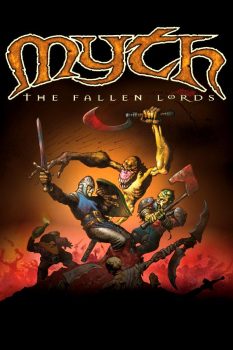 So….one of the rabbit holes I periodically jump down is Total War: Warhammer II. That’s easily my favorite in the Total War series (I played a boatload of TW: I as well. You can use units from I, in II, in some campaigns, which increases the utility of the first game. I appreciate that.
So….one of the rabbit holes I periodically jump down is Total War: Warhammer II. That’s easily my favorite in the Total War series (I played a boatload of TW: I as well. You can use units from I, in II, in some campaigns, which increases the utility of the first game. I appreciate that.
I struggle with the first 15-or-so turns, and frequently abandon a new game, pick another faction, and try again. I like playing different factions, so that’s fine. Also, I often plateau around 70-75 turns, and start a new game as well.
I reinstalled TW: I and II last month and have been playing again. It’s been fun. After a half-dozen false starts, I’m having one of my most successful games leading a chivalry-based, Middle Ages-type faction (WH is a fantasy world, with elves, orcs, beastmen, etc). And I realized I was applying the principles that George Washington advised America about in his famous Farewell Address. Being a Constitutional Convention of 1787 wonk, I’m reasonably familiar with Washington, who presided over the Convention.
However, as I type this right now, it is obvious that such a post is definitely not gonna be ready for tomorrow morning (which would be when this one went live – Monday the 3rd.
And let met tell you, there are multiple elements of Washington’s Address that apply today. Including about people in the country undermining it by pitting one group against another. And that applies to quite a few groups/people…
So instead, we’re talking about a few Real Time Strategy (RTS) games I’ve played over the years. The basic definition of RTS is games that don’t move forward incrementally in turns, but move along in ‘real time.’
The old Warcraft: Orcs and Humans was the first one I really got into, way back in the mid-nineties, which was the birth era of RTS. I never played World of Warcraft, but I ate up the first two Warcraft games (Starcraft followed, and was also immensely popular, but I never tried that one).
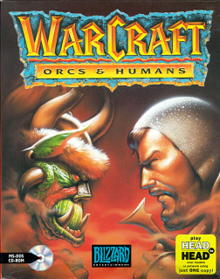 I think I played Command and Conquer for a very short time, but I don’t really remember that. It was kind of a high point of that style of RTS.
I think I played Command and Conquer for a very short time, but I don’t really remember that. It was kind of a high point of that style of RTS.
Age of Empires came along a few years later, and I played the heck out of that, as well as Age of Empires II. Both got rehabs and updates, and AoE II is totally playable. A buddy of mine is still addicted to the new version. AoE II is a classic which is still growing.
A few years ago, my son and I played a LOT of Star Wars: Empire at War, which came out in 2006. It swapped out resource gathering with a point-of-control system. It is a ton of fun.
For a Tolkien fan, Battle for Middle Earth I was fantastic. I didn’t play II, which I’ve heard was even better. It is possible to find an updated version of II that runs on modern Windows, but I haven’t managed to make that happen. Might really dial in on it sometime, and try. I was REALLY good for Tolkien fans.
There was a decent-enough D&D knock-off version, Dragonshard, in 2005. It mixed in a bit more RPG elements. I played it some, but Battle for Middle Earth was definitely superior.
Sid Meier is possibly the greatest game-creator of all time, with Civilization one of the most influential and popular games ever. His first game after leaving MicroProse was Sid Meier’s Gettysburg!, and it is a terrific Civil War game. You need to be totally immersed in it, but it’s a great Civil War game. Sid Meier’s Antietam! was similar.
And Railroad Tycoon was the standard railroad sim for a long time. 2018’s Railway Empire was a blast, and I have played that a fair amount.
I think it’s definitely cool that RTS is not limited to combat games (there are RTS World War games as well – I’ve only dabbled in those). Tropico, and Sim City, are two examples of RTS-type city-building games. I played a LOT of the first Tropico – that’s a fun game.
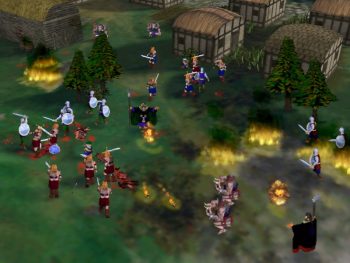 The only game that rivals TW:WH II for me, came out WAAAY back in 1997. Man, how can that be almost 30 years ago? I feel really old. But Bungie’s Myth: The Fallen Lords, was a terrific achievement. Story and game-play: just the EXPERIENCE.
The only game that rivals TW:WH II for me, came out WAAAY back in 1997. Man, how can that be almost 30 years ago? I feel really old. But Bungie’s Myth: The Fallen Lords, was a terrific achievement. Story and game-play: just the EXPERIENCE.
The land has fallen under almost total control of the forces of light (The Fallen Lords), led by Balor. The Light is led by powerful sorcerers, and you control an elite army unit called The Legion. You need to overcome The Fallen Lords. The developers cited Mel Gibson’s Braveheart, and Glen Cook’s fantastic The Black Company (you surely read my interview with him, here), as inspirations.
It is actually an RTT (Real Time Tactical) game. No resource gathering, no settlement growing. You don’t develop skill trees and build up unit strength. You start each scenario with your force fully ready to go.
It was essentially a unit-based combat game (NOT turn-based). But playing it still felt like a combat-based RTS, back then. Terrain and weather impacted things, which was neat at the time. You controlled units (usually in groups) to win battles. And no game I ever played had friendly fire as such a part of it. Those dwarven Molotov cocktails could take out your own forces.
Project Magma has converted the game to operate on current Windows systems. If I could focus in on it, I would probably go through the multiple steps and play this again. But TW: WH I, and II, are already installed, ready to play, and twenty years newer. Still, Myth Lords is one I’m tempted to try.
There was a sequel, and a prequel. But that original game is a masterpiece.

Bob Byrne’s ‘A (Black) Gat in the Hand’ made its Black Gate debut in 2018 and has returned every summer since.
His ‘The Public Life of Sherlock Holmes’ column ran every Monday morning at Black Gate from March, 2014 through March, 2017. And he irregularly posts on Rex Stout’s gargantuan detective in ‘Nero Wolfe’s Brownstone.’ He is a member of the Praed Street Irregulars, founded www.SolarPons.com (the only website dedicated to the ‘Sherlock Holmes of Praed Street’).
He organized Black Gate’s award-nominated ‘Discovering Robert E. Howard’ series, as well as the award-winning ‘Hither Came Conan’ series. Which is now part of THE Definitive guide to Conan. He also organized 2023’s ‘Talking Tolkien.’
He has contributed stories to The MX Book of New Sherlock Holmes Stories — Parts III, IV, V, VI, XXI, and XXXIII.
He has written introductions for Steeger Books, and appeared in several magazines, including Black Mask, Sherlock Holmes Mystery Magazine, The Strand Magazine, and Sherlock Magazine.
Book review: The Devil By Name by Keith Rosson (Fever House #2)

ABOUT THE AUTHOR: Keith Rosson is the author of the novels The Mercy of the Tide and Smoke City, and his short fiction has appeared in Cream City Review, PANK, December, The Nervous Breakdown, and more. He's been twice nominated for a Pushcart Prize and a finalist for the Birdwhistle Prize for Short Fiction. He’s also an illustrator and graphic designer, with clients that include Green Day, Against Me, the Goo Goo Dolls, and others. A fierce advocate of public libraries and non-ironic adulation of the cassette tape, he can be found at keithrosson.com.
Publisher: Random House (September 10, 2024) Length: 400 pages Formats: audiobook, ebook, paperback
The Devil by Name picks up five years after Fever House with all the chaos, gore, and gripping drama you’d expect—and then some. The world is still reeling from “The Message,” a weaponized sound that turned much of humanity into bloodthirsty monsters called the fevered. With Terradyne Industries running the show and humanity clinging to survival, the stakes have never been higher.
The book is a wild ride; it takes elements of horror, noir, and spy thriller vibes and turns them into a splatterfest that somehow still manages to be emotionally grounded. John Bonner, riddled with guilt and desperate for redemption, Katherine Moriarty, coping with devastating loss, and Naomi Laurent, a teenager with a mysterious, world-altering gift, are all struggling. Newcomer Dean Haggerty, a warm, resourceful scavenger, is an unexpected bright spot, bringing a glimmer of hope to a grim story.
Yes, the gore is intense, and the body horror will stick with you long after you’ve turned the last page (looking at you, “tortured fevered in the chair”). But here’s the thing - Rosson knows how to find a balance between the carnage and emotional depth, and his take on grief, redemption, and survival feels raw and real. The character arcs are top-notch, with even minor players leaving a mark. Katherine’s transformation, in particular, is spectacular.
The pacing is relentless, and while some plot conveniences (a possible cure-all across the ocean, for example) might raise an eyebrow, the story’s intensity and emotional pull make it easy to forgive. Rosson ties up loose ends from Fever House while introducing fresh twists, taking the story in surprising directions.
The final chapters are pure nightmare fuel, and the emotional punches hit hard. If you’re into stories that mix terror, heart, and a touch of hope, The Devil by Name delivers big time. It’s the kind of book that leaves you a little haunted but entirely satisfied.
Snake Eyes by Mark Henwick
Urban Fantasy
This is book 8 in the Amber Farrell / Bite Back series. To start at the beginning read the novella Raw Deal or Book 1, Sleight of Hand.

The first four of five books in the series were very much about discovery. Amber Farrell who is vampire, werewolf and witch was learning who she was. All the while battling the bad guys and each supernatural community where she was considered an abomination.
The more recent books have been about joining her separate parts, I guess “becoming” is a good word. And the last couple of books, Queen of Diamonds and Snake Eyes (essentially one book broken into two parts) seem to me to be her arriving at who she is.
This series is honestly one of the best. If you look at the books I read, you’ll notice 90% plus are written by women. Mark Henwick is one of a handful of male authors I read and reread. I’ve probably read most of the books in this series a dozen times. So if you love Urban Fantasy, do yourself a favour. Read Amber Farrell.
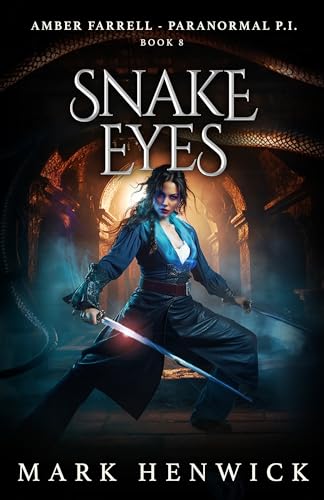
Audiobook Review: Tartufo by Kira Jane Buxton
I received a review copy from the publisher. This does not affect the contents of my review and all opinions are my own.
Mogsy’s Rating (Overall): 3.5 of 5 stars
Genre: Contemporary, Humor
Series: Stand Alone
Publisher: Hachette Audio (January 28, 2025)
Length: 11 hrs and 31 mins
AuthorInformation: Website | Twitter
Narrator: Caroline Hewitt
After thoroughly enjoying Kira Jane Buxton’s Hollow Kingdom series, I was looking forward to checking out Tartufo even though her newest novel falls outside my usual genres. I was mainly curious to see how her quirky sense of humor would transfer to a different kind of story, and while Tartufo does indeed take a more grounded approach, it still carries the author’s signature charm. Still, despite its playfulness and whimsy, the novel didn’t quite capture me in the same way as her previous work.
Set in the small, fictional Italian village of Lazzarini Boscarino, Tartufo tells the tale of a group of residents who will do anything to keep their dying town on the map. With most of the younger generation having departed for greener pastures in the big cities, the remaining aging population is left to hold what’s left of their beloved home together. But the crisis deepens as it is revealed that the previous mayor had died without leaving any available funds for rebuilding and revitalizing. Now his daughter Delizia returns home to handle his affairs only to find herself elected as the new mayor—after nearly losing the race to a donkey—with the unenviable task of turning things around, all the while struggling with her own personal ambitions and disappointments.
Then one day, a local truffle hunter named Giovanni heads out into the forest with his dogs, doing what he loves most, when he suddenly stumbles upon an enormous truffle—quite possibly the largest specimen the world has ever seen. Realizing its potential, Giovanni brings it to the rest of the village, hoping it’s exactly what they need to bring attention back to Lazzarini Boscarino. However, what begins as a stroke of extraordinary luck soon spirals out of control as the attention the town receives also includes that of the negative variety, motivated by enmity and greed. Instead of bringing the community together, the discovery of the truffle threatens do the exactly opposite, forcing everyone to question what future they want for their town.
If you’re looking for some casual reading or a book to sit back and relax with, Tartufo is the perfect choice—relatively low stakes, brimming with charm and wit. For me, it felt a lot like watching a lighthearted musical. The human characters are oddballs, with some portrayals leaning into satire and caricature, filling the cast with over-the-top personalities that wouldn’t feel too out of place in a stage comedy. The novel is also a treat for the senses. Descriptive writing is dialed up to the max, painting a gorgeously evocative picture of the setting. The Italian countryside is described so vividly you can practically smell the delicious scent of food and wine in the restaurants and feel the warmth under the Mediterranean sun. The village of Lazzarini Boscarino is itself as much a character as its eccentric inhabitants, written with the same amount of care and detail.
Buxton has also chosen to tell this story in an omniscient point of view, a brilliant decision which allowed her to do something that has become part of her signature style—writing from the perspective of animals. Inserted between character POVs are scenes told through the eyes of creatures like Giovanni’s truffle-hunting dog, a cat named Al Pacino (despite it being female), and even a passing honeybee. Not only is it reminiscent of the Hollow Kingdom series, which was told through the eyes of a very clever crow, it’s a quirk of the writing which adds an unexpected layer of depth to the story.
Despite the whimsical nature of Tartufo, there’s a distinct lack of supernatural elements, though that alone didn’t take away from my enjoyment. More challenging was the way the narrative juggles so many different POVs, leaving some important characters underdeveloped. It’s also a little too silly in places, making it harder for me to fully immerse myself in the conflict, and there were moments where I wished for more emotional depth.
Nevertheless, Tartufo remains a delightful read, showcasing Kira Jane Buxton’s storytelling abilities. While the playful tone occasionally goes overboard with it and becomes tiresome, on the whole the book is entertaining and endearing. At its heart, it’s a story about togetherness and the dreams of a community, and though I didn’t connect with it as deeply as the author’s Hollow Kingdom, I still had a good time with its humor and themes.
![]()
![]()
The Fiction of Edgar Rice Burroughs, Part II: Tarzan and The Land That Time Forgot
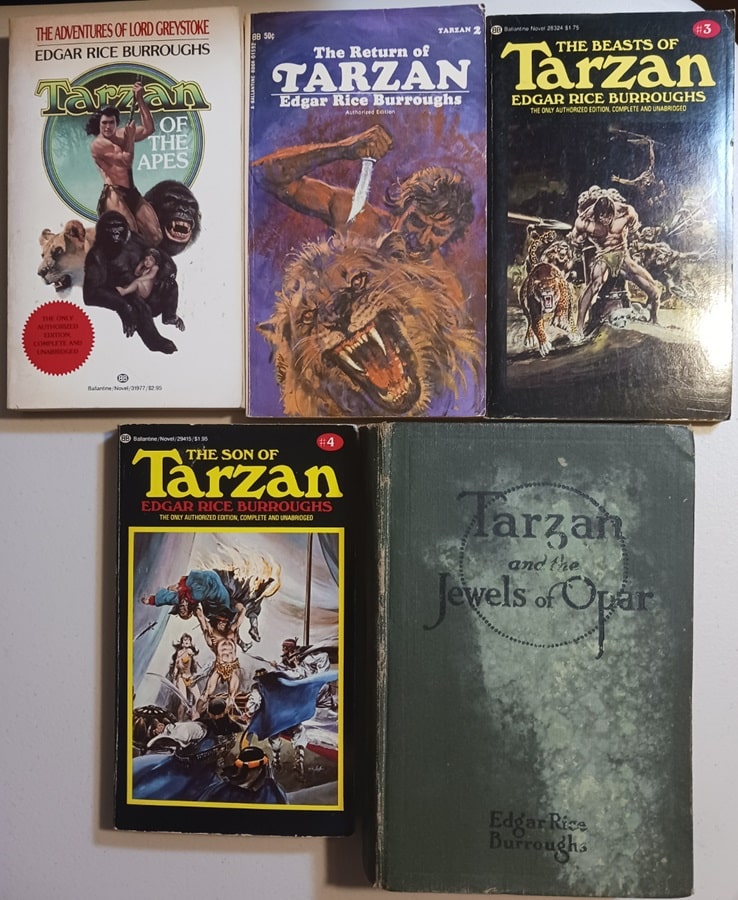 Tarzan novels #1 – #5 : Tarzan of the Apes, The Return of Tarzan, The Beasts of Tarzan, and The Son of Tarzan (Ballantine Books, December 1983, April 1969, April 1975, April 1975), and Tarzan and the Jewels of Opar (A.L. Burt, 1919). Covers by Charles Ren, Bob Abbett, Neal Adams, and Neal Adams.
Tarzan novels #1 – #5 : Tarzan of the Apes, The Return of Tarzan, The Beasts of Tarzan, and The Son of Tarzan (Ballantine Books, December 1983, April 1969, April 1975, April 1975), and Tarzan and the Jewels of Opar (A.L. Burt, 1919). Covers by Charles Ren, Bob Abbett, Neal Adams, and Neal Adams.
Any discussion of Sword & Planet fiction needs to start with Edgar Rice Burroughs and his book A Princess of Mars. I discussed that series extensively — and also his other S&P series, the Carson of Venus books, and his Moon Maid trilogy, which is partially S&P — in Part I of this series.
But, of course, ERB wrote many other books that have no connection to S&P fiction. They are still very good stories, though, entertaining and worth discussing. I thought I’d cover some in my next series of posts.
Most readers I know discovered ERB through the character of Tarzan. The first ERB I read was A Princess of Mars, but the second one was Tarzan Lord of the Jungle. The book was an old hardback, with no dust cover. The cover was generally brown with the title embossed on it. I found it among my sister’s books. She was the only other big reader in my family. I don’t know how she came upon it. I still remember some fifty+ years later the opening scene, with Tarzan dozing on the back of Tantor the elephant. And before long Tarzan finds a lost civilization of crusaders in deepest Africa. And there was swashbuckling.
[Click the images for Tarzan-sized versions.]
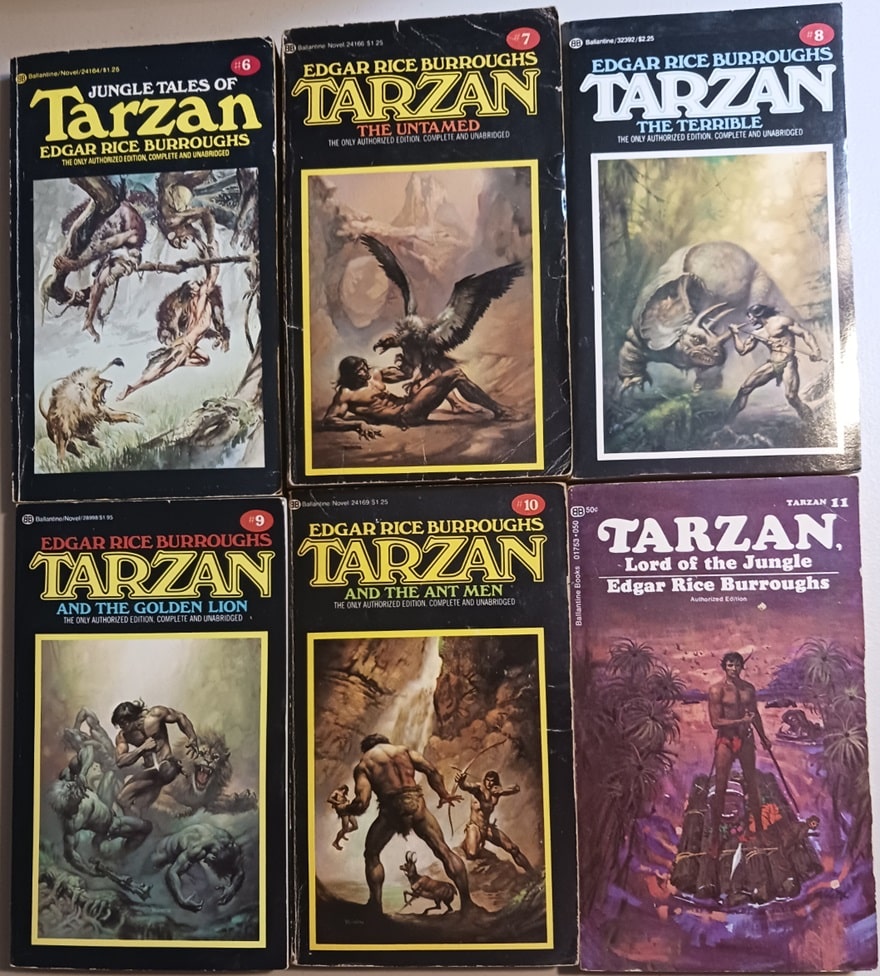 Tarzan #6 – #11: Jungle Tales of Tarzan, Tarzan the Untamed, Tarzan the Terrible, Tarzan and the Golden Lion, Tarzan and the Ant Men, and Tarzan, Lord of the Jungle (Ballantine Books, 1975-1976, and 1969). Covers by Neal Adams, Boris Vallejo, and Bob Abbett.
Tarzan #6 – #11: Jungle Tales of Tarzan, Tarzan the Untamed, Tarzan the Terrible, Tarzan and the Golden Lion, Tarzan and the Ant Men, and Tarzan, Lord of the Jungle (Ballantine Books, 1975-1976, and 1969). Covers by Neal Adams, Boris Vallejo, and Bob Abbett.
I’ve always liked best the Tarzan tales where he discovers a lost race. There were a lot of them in Africa, apparently. That copy of the book fell apart and I eventually replaced it with a paperback. When I started buying the Tarzan books I couldn’t afford to get them all at once, and I also picked up ones here and there from used bookstores or book sales. Most of the ones I found were from the Ballantine editions, many with great Boris Vallejo covers, which became my “mind’s eye” image of Tarzan.
Above I show the first 11 books in my collection. All but Jewels of Opar are from Ballantine, published between 1963 and 1973 it looks like. Covers are varied.
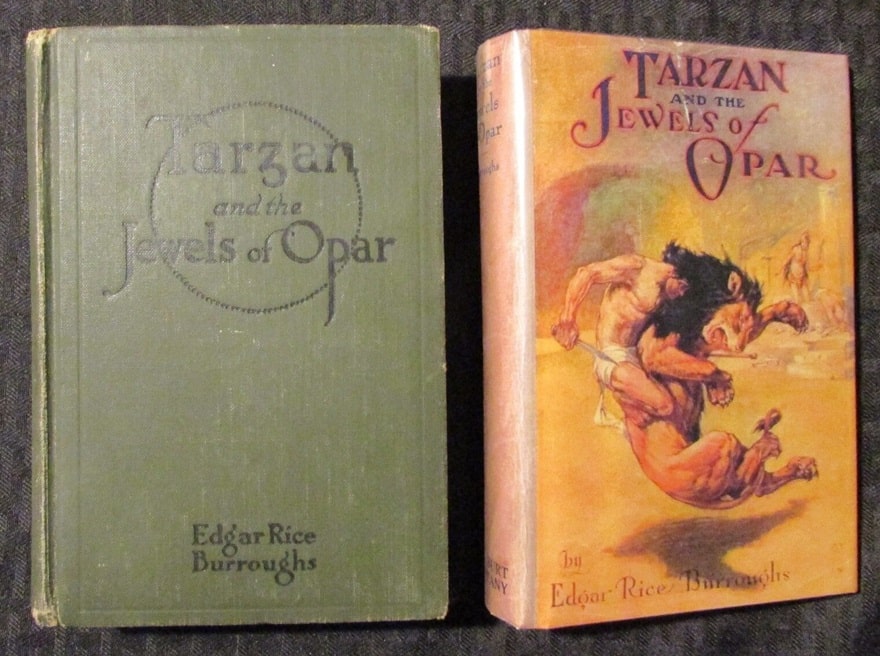 Tarzan and the Jewels of Opar (A.L. Burt Company, 1919). Cover by J. Allen St. John
Tarzan and the Jewels of Opar (A.L. Burt Company, 1919). Cover by J. Allen St. John
Here’s the list of cover artists.
Tarzan of the Apes; Charles Ren
The Return of Tarzan; Robert Abbett
Beasts of, Son of, Jungle Tales of; Neal Adams
Untamed, Terrible, Golden Lion, Ant Men; Boris Vallejo
Lord of the Jungle; Robert Abbett
My copy of Tarzan and the Jewels of Opar was published in 1919 by A. L. Burt Company. It lacks a dust cover, but above is a picture I took off the internet of what it apparently looked like. The beautiful cover is by J. Allen St. John (1872 – 1957), who was an incredible artist.
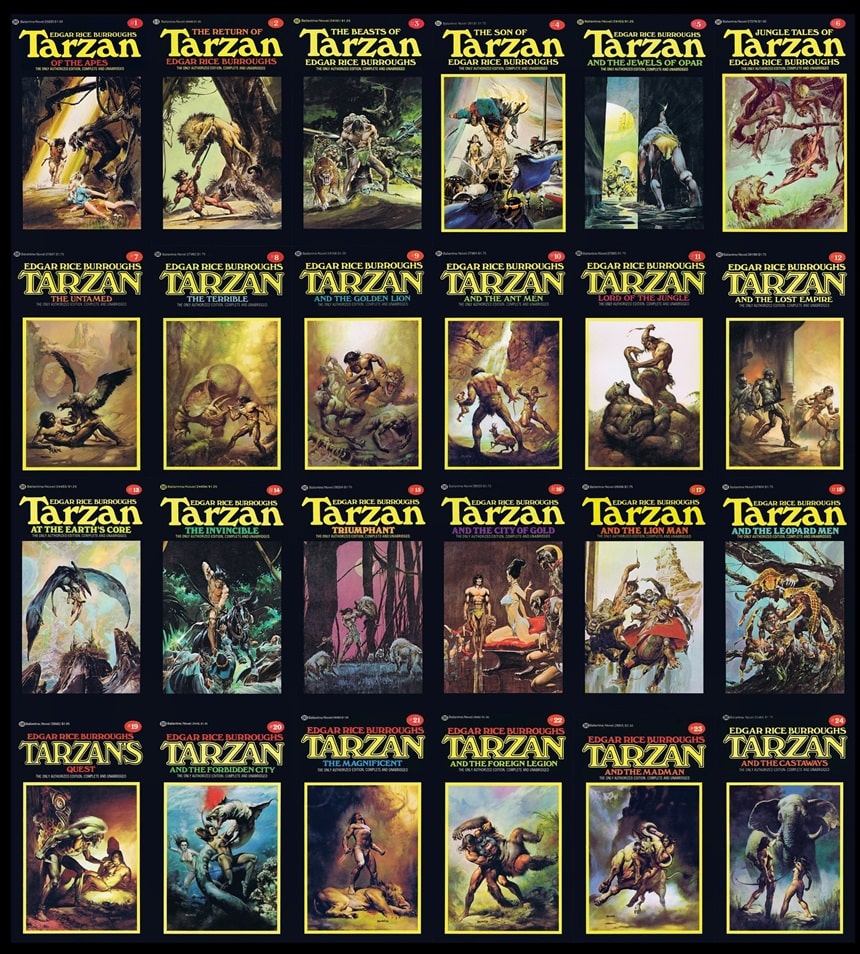 The 24 Tarzan novels and collections published in sequence in paperback by Ballantine Books, 1975 – 1977. Covers by Neal Adams and Boris Vallejo
The 24 Tarzan novels and collections published in sequence in paperback by Ballantine Books, 1975 – 1977. Covers by Neal Adams and Boris Vallejo
Burroughs wrote 26 books about Tarzan, but typically only 24 are counted as part of the main sequence. The two odd numbers out are The Tarzan Twins, which I have, and Tarzan and the Tarzan Twins with Jad-Bal-Ja The Golden Lion, which I’ve never seen. These are novellas written for young readers. They were published separately but were collected together at one point, although I can’t find a copy of that publication.
The copy of The Tarzan Twins that I have is from Wildside Press with a cover by Douglas Grant. It’s the only ERB book I don’t like and doesn’t even seem like ERB to me. ERB’s work was already accessible to young readers. Most people I know read them pretty young, so for him to “try” to write down to kids just didn’t work — at least to me.
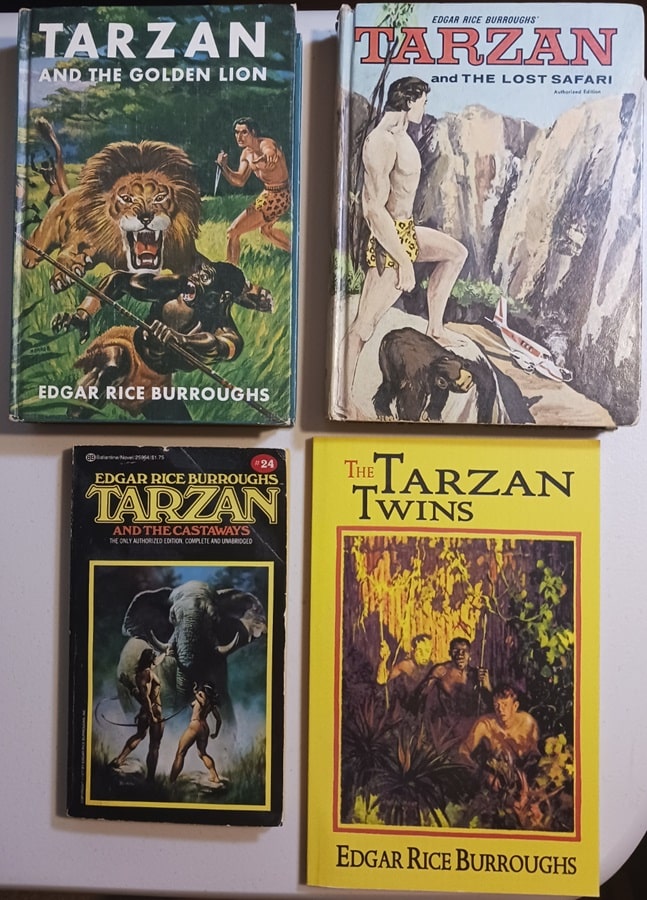 Tarzan and the Golden Lion (Grosset & Dunlap, 1949), Tarzan and the Lost Safari (Whitman Publishing, January 1, 1966, author unknown), Tarzan and the Castaways (Ballantine, September 1977), and The Tarzan Twins (Wildside Press, September 14, 2005). Covers by C. Edmund Monroe, Jr., Tony Sgroi, Boris Vallejo, and Douglas Grant.
Tarzan and the Golden Lion (Grosset & Dunlap, 1949), Tarzan and the Lost Safari (Whitman Publishing, January 1, 1966, author unknown), Tarzan and the Castaways (Ballantine, September 1977), and The Tarzan Twins (Wildside Press, September 14, 2005). Covers by C. Edmund Monroe, Jr., Tony Sgroi, Boris Vallejo, and Douglas Grant.
Overall, the Tarzan series is certainly not my favorite among ERB’s work anyway. They’re actually fairly low on my list of ERB favorites, although — don’t get me wrong — still very good. A ranking of my favorite series would be John Carter, Moon Maid, Carson of Venus, Land that Time Forgot, and Pellucidar, with Tarzan coming after that. Some of my favorite standalones would be The Outlaw of Torn, The Mad King, and I Am A Barbarian.
The Tarzan tales were almost certainly influenced by Rudyard Kipling’s jungle book tales of Mowgli, the wild boy of the forest — which in turn was influenced by some true reports from the mid-1800s of children in India being raised by wolves. ERB may have been directly aware of those same tales as well, and likely knew of the “Wild Boy of Aveyron,” who, around 1800, was found living in the wilds in France. The French feral child was named Victor by one of his “rescuers.” Unlike Tarzan, he never really learned to speak, although he apparently understood some language.
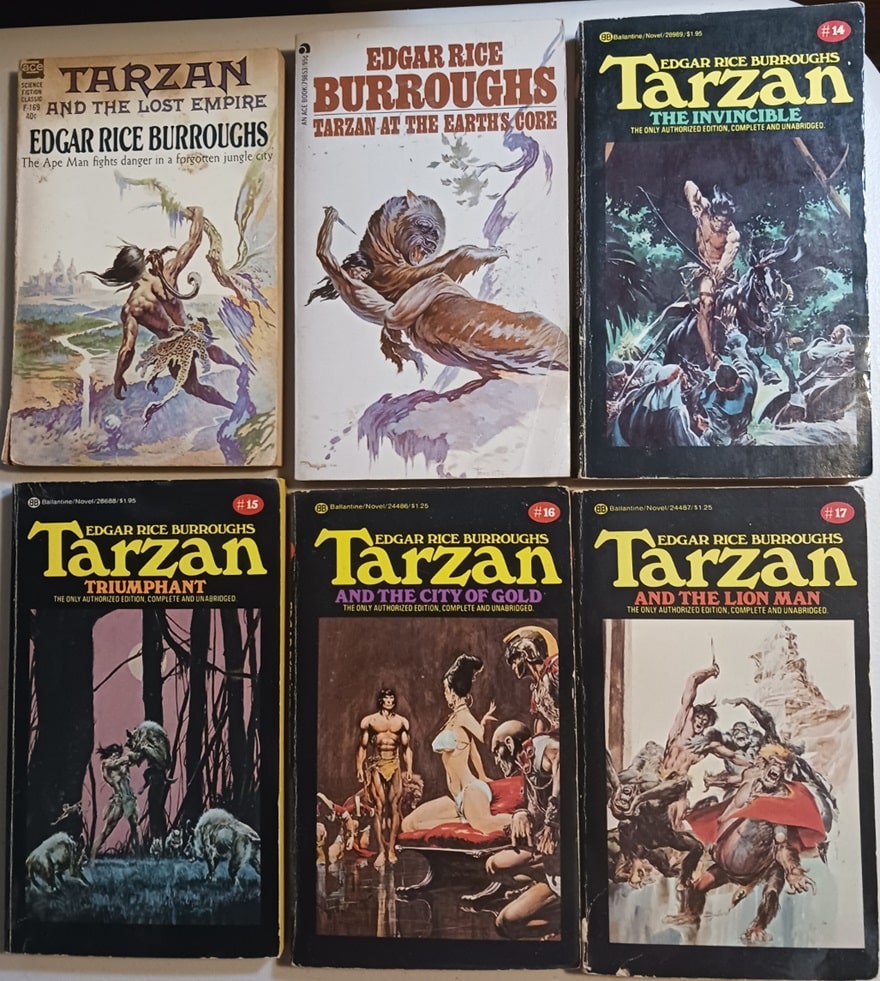 Tarzan #12 – #17: Tarzan and the Lost Empire and Tarzan at the Earth’s Core (Ace Books, November 1962 and March 1963), and Tarzan the Invincible, Tarzan Triumphant, Tarzan and the City of Gold, and Tarzan and the Lion Man (Ballantine Books, November 1975). Covers by Frank Frazetta and Neal Adams.
Tarzan #12 – #17: Tarzan and the Lost Empire and Tarzan at the Earth’s Core (Ace Books, November 1962 and March 1963), and Tarzan the Invincible, Tarzan Triumphant, Tarzan and the City of Gold, and Tarzan and the Lion Man (Ballantine Books, November 1975). Covers by Frank Frazetta and Neal Adams.
Above and below are the remaining Tarzan book pictures from my collection. The Ace copy of Lost Empire with the Frazetta cover that looks like it was inspired by Roy Krenkel Jr’s work is a real prize. I also have an Ace copy of Tarzan at the Earth’s Core, which also ties into ERB’s Pellucidar series, with a wonderful Frazetta cover.
The rest of my regular series are all Ballantine, with the following cover artists.
Invincible, Triumphant, City of Gold, Lion Man, Leopard Men; Neal Adams
Quest, Forbidden City, Magnificent, Foreign Legion, Madman, Castaways; Boris Vallejo
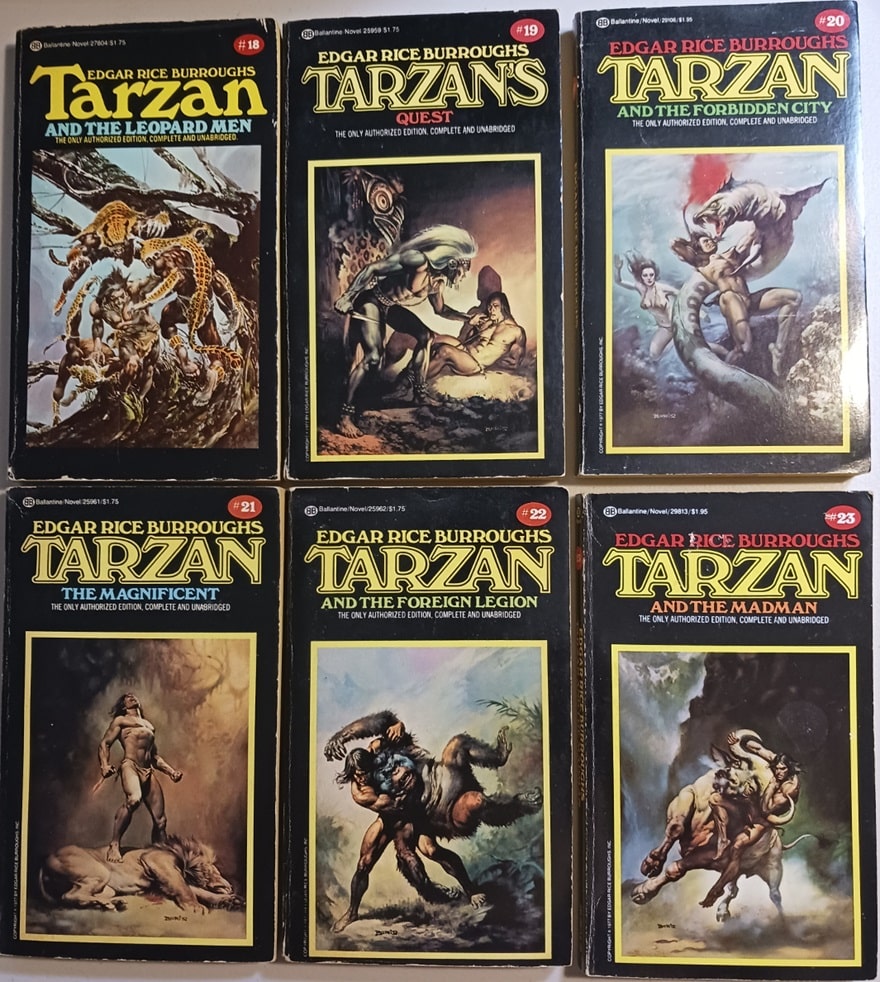 Tarzan #18 – #23: Tarzan and the Leopard Men ((Ballantine Books, November 1975, cover by Neal Adams), and Tarzan’s Quest, Tarzan and the Forbidden City, Tarzan the Magnificent, Tarzan and the Foreign Legion, and Tarzan and the Madman (Ballantine Books, September 1977, covers by Boris Vallejo).
Tarzan #18 – #23: Tarzan and the Leopard Men ((Ballantine Books, November 1975, cover by Neal Adams), and Tarzan’s Quest, Tarzan and the Forbidden City, Tarzan the Magnificent, Tarzan and the Foreign Legion, and Tarzan and the Madman (Ballantine Books, September 1977, covers by Boris Vallejo).
My second copy of Tarzan and the Golden Lion is from Grosset & Dunlap and clearly looks targeted toward younger readers with that cover (see above) — which is pretty cringeworthy for moderns. Not sure when it was published or who the cover artist might be.
Tarzan and the Lost Safari is adapted from the Tarzan movie of that same name. It was published by Whitman and doesn’t list an author, although I’ve seen Frank Castle’s name attached to it. I’ve seen this book for sale as by “Edgar Rice Burroughs.” It’s not. It’s closer to the movie Tarzan than to ERB’s creation. I didn’t find it very entertaining.
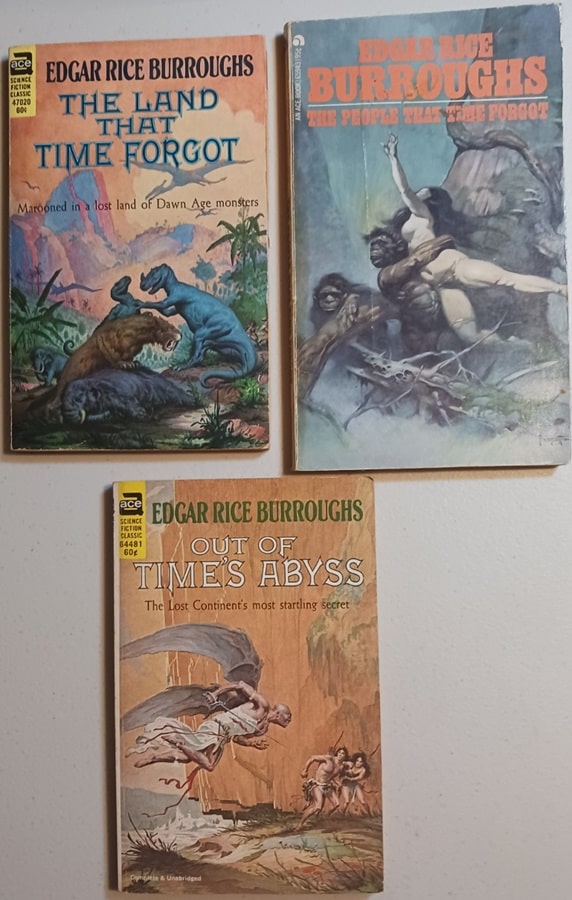 Three novels of The Lost Continent by Edgar Rice Burroughs: The Land That Time Forgot, The People That Time Forgot, and Out of Time’s Abyss (Ace Books, 1963, January 1973, and October 1963). Covers by Roy Krenkel, Jr, Frank Frazetta, and Roy Krenkel, Jr.
Three novels of The Lost Continent by Edgar Rice Burroughs: The Land That Time Forgot, The People That Time Forgot, and Out of Time’s Abyss (Ace Books, 1963, January 1973, and October 1963). Covers by Roy Krenkel, Jr, Frank Frazetta, and Roy Krenkel, Jr.
I personally don’t believe that ERB has been well served by the film and TV industries. I may be in the minority here but I find the early Tarzan movies to be virtually unwatchable. They seem to have very little to do with ERB’s characterization of Tarzan. The first Tarzan movie I actually liked was Greystoke: The Legend of Tarzan, starring Christopher Lambert. It still wasn’t the Tarzan I knew from the books but they made an effort to capture some of the character’s origins. I also liked most of the 2016 Legend of Tarzan, with Alexander Skarsgard, who I believe captured the essence of the character better than any previous Tarzan.
I generally liked the John Carter of Mars film, although they made changes that weren’t needed, but my favorite ERB adaptations are definitely a couple of B-movies starring Doug McClure. I’m talking about The People that Time Forgot, and The Land that Time Forgot. I’ve given these — especially the first one — frequent rewatches. Although the special effects are pretty awful by modern standards, the spirit of ERB’s stories shine through, the mystery and the exotic.
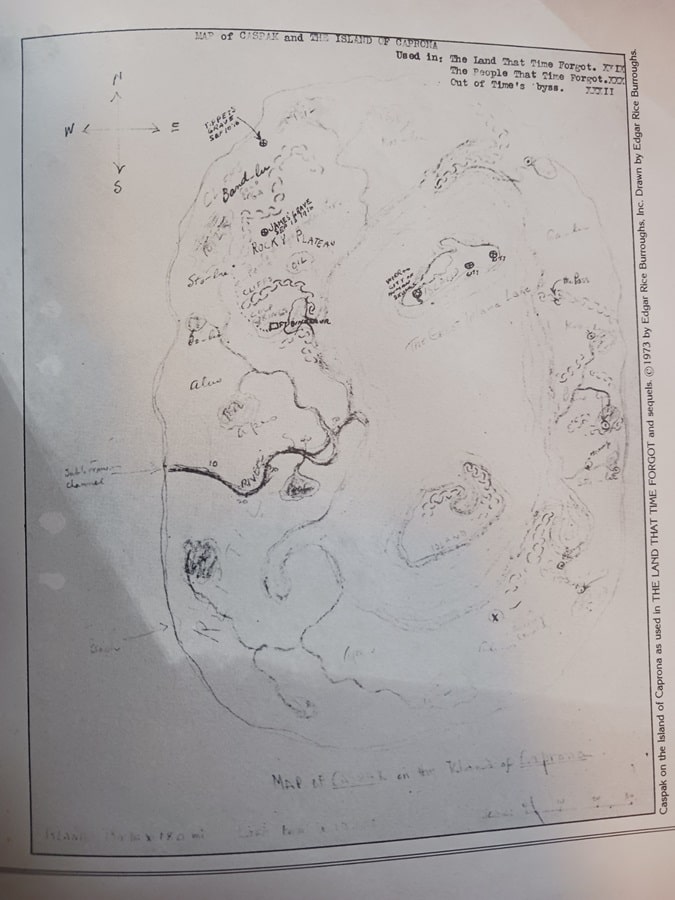 A map of Caprona, the Land that Time Forgot, from An Atlas of Fantasy by J. B. Post (Ballantine Books, 1979)
A map of Caprona, the Land that Time Forgot, from An Atlas of Fantasy by J. B. Post (Ballantine Books, 1979)
Of course, I loved the trilogy that spawned these movies — The Land that Time Forgot, The People that Time Forgot, and Out of Time’s Abyss. I thought Doug McClure did a good job with the character of Bowen Tyler, who becomes the first American to set foot on Caprona, a lost world near Antarctica where time seems to have stopped and dinosaurs still survive. There’s also a deep mystery about how things “evolve” on Caprona, though I won’t give it away.
Above are the three copies I have, all from Ace. Frazetta did the cover for The People while the other two are by Roy Krenkel, Jr. I’m also including a map of Caprona featured in An Atlas of Fantasy.
More on Burroughs next time.
Charles Gramlich administers The Swords & Planet League group on Facebook, where this post first appeared. His last article for Black Gate was The Fiction of Edgar Rice Burroughs, Part I: Sword and Planet.

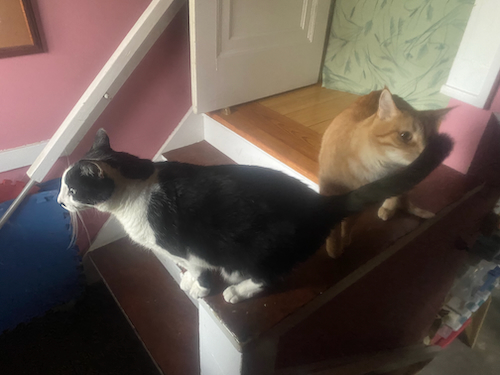
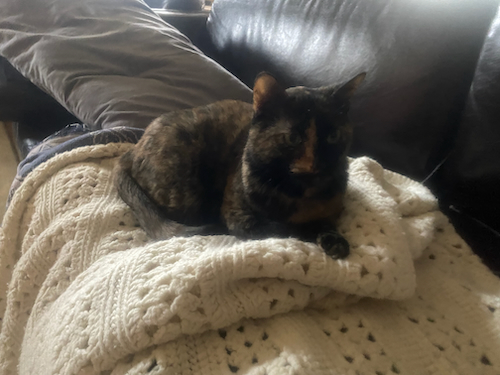
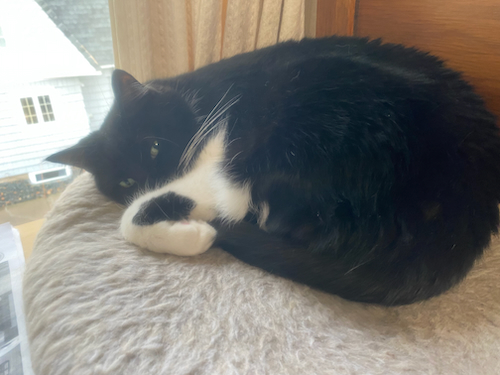
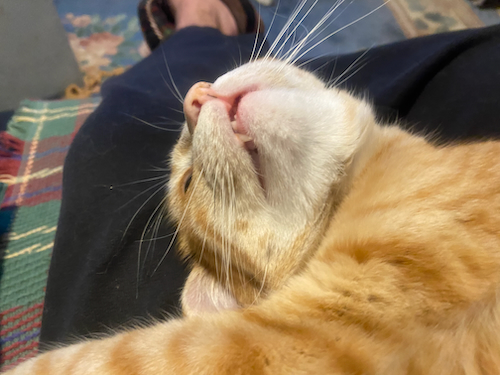
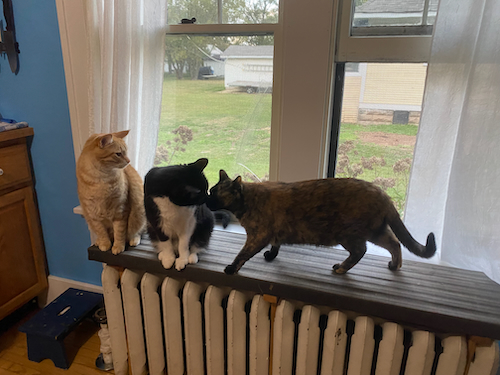

Recent comments